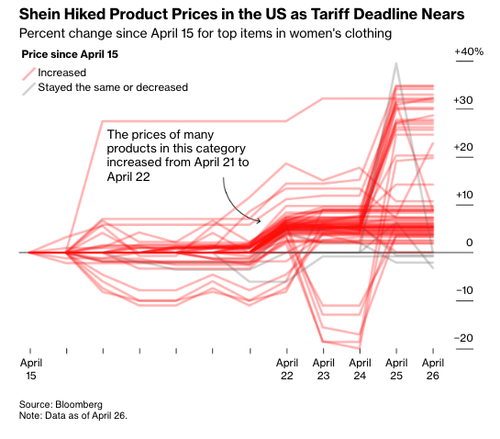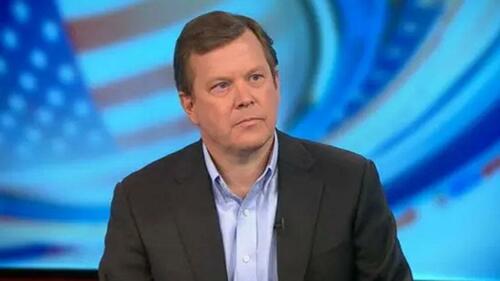It is sad that there are what you might call professional Catholics who make a living on their Catholicism, but in whom the spring of faith flows only faintly, in a few scattered drops. We must really make an effort to change this.
Distinction Matter - Subscribed Feeds
-
Site: Real Investment Advice
The Fed removed its handcuffs on banks, allowing them greater flexibility to trade and hold crypto assets. Before Thursday's action, banks were asked to seek advance approval from the regulators before participating in crypto-related activities. Further, the Fed removed guidance that banks exercise caution with crypto due to its volatility, liquidity, and legal uncertainty.
The Federal Reserve Board on Thursday announced the withdrawal of guidance for banks related to their crypto-asset and dollar token activities and related changes to its expectations for these activities. These actions ensure the Board's expectations remain aligned with evolving risks and further support innovation in the banking system.
The Fed's move should help ease Powell's troubled relationship with Trump. It may further explain why Trump reversed his stance on firing Powell. Trump has been pushing a pro-crypto agenda. Thus, allowing banks easier access to trade and hold cryptocurrencies will go a long way toward satisfying his wishes.

What To Watch Today
Earnings

Economy

Market Trading Update
Last week, we discussed the issue with the spat between President Trump and the Federal Reserve chairman, Jerome Powell. As noted then:
“While the markets await the next Federal Reserve meeting, the uncertainty over monetary policy weighs on markets as much as the uncertainty about tariffs. This past week, the market reversed some of its gains from the massive “tariff reprieve” surge. With the MACD back on a buy signal and money flows turning positive, buyers are tepidly stepping back into the market. The 20-DMA continues to act as overhead resistance, defining the current downtrend. While there is undoubtedly a risk of another test of recent lows, which should be expected and why caution remains advisable, a break above the 20-DMA would lead to a rally to the 50-DMA. (Monday’s article addressed the “Death Cross” and what it means for investors.)“
The market rallied above the 20-DMA this past week as investors found some “silver linings” to the ongoing tariff dispute. Despite China saying “no negotiations” had started with the U.S., comments from both President Trump and Scott Bessent suggested that the Administration would “be nice” to China and that a “very good deal” could be done between the two countries. As we have noted previously, given the more extreme oversold condition of the market, any “good news” would allow investors to push stocks higher.
As stated, the market cleared initial resistance at the 20-DMA, but there is a heavy band of resistance just ahead at the level where the market was trying to bottom ahead of the tariff announcements. Just above that is the confluence of the 50- and 200-DMAs. While markets are not overbought yet, sellers will likely re-emerge if the market pushes further into those resistance levels. As we have suggested over the last two weeks, we are likely in for a rather protracted consolidation action as the market digests ongoing trade negotiations, slower economic growth, and reduced earnings expectations. Therefore, we should expect continued pullbacks and rallies until the market resolves the seller imbalances.

What is very interesting about the recent market decline is that while professional and “older investors,” who are presumably more experienced, are very “bearish” about their investment outlook, retail investors have been “buying the dip” at the most on record going back to early 2023.

However, while you may shake your head in disbelief, buying markets when they are down has been an essentially winning strategy for dip buyers over the last decade. Of course, such should be unsurprising given repeated rounds of monetary and fiscal interventions. As previously discussed, the Fed has engendered an entire generation of young investors with a sense of “moral hazard.” To wit:
“From a market perspective, the liquidity flows from the Federal Reserve increased speculative appetites and investors piled into “zombies” with reckless abandon. Why? Because of a lack of incentive to guard against risk as investors believe the Fed is protecting them from the consequences of risk. In other words, the Fed has “insured them” against potential losses.”

Will this time be different? Maybe. There will be a point where taking on excessive speculative risk in leveraged ETFs and options leads to poor outcomes. However, that may not be today. As such, we need to be mindful that buyers and sellers drive markets. Until the markets change investors’ speculative attitudes, we will likely continue to find support in markets even though we may think there shouldn’t be.

The Week Ahead
Earnings kick into full gear this week, with the most prominent companies reporting. Accordingly, earnings, revenues, and, perhaps most importantly, forward guidance will help steer the market this week. Microsoft and Meta will headline earnings on Wednesday, followed by Apple, Amazon, and Eli Lilly on Thursday. Moreover, there will be reports from companies such as Exxon, Chevron, McDonald's, Mastercard, Visa, and Coca-Cola.
Data on the labor market, inflation, and the economy will be released this week. JOLTS, ADP, and the BLS will update us on the state of the labor markets on Tuesday, Wednesday, and Friday, respectively. Any weakness may provide rationale for the Fed to cut sooner rather than later. Furthermore, GDP and PCE prices will inform the Fed on the state of the economy and prices on Wednesday. The graph below shows that the Atlanta Fed GDPNow forecasts that the economy may have contracted by 2.5%. However, the Wall Street consensus remains slightly positive.
Last week, the Fed was all over the map, from Powell's more hawkish tone to talk of a June rate cut by other Fed members. The Fed seems confused about the impact of tariffs on inflation. At the same time, they worry the economy is slowing and unemployment is rising, but they have little data to substantiate that claim. Accordingly, they appear handcuffed. Unfortunately, we won't get much insight from Fed speakers this week as they enter their media blackout before next week's FOMC meeting.

Speculator Or Investor? 10 Rules From Legendary Investors
Are you a “speculator” or an “investor”? This is an essential question that every individual deploying capital into the financial markets must answer. The reason is that how you answer that question determines how you should behave during market cycles. Over the last 15 years, due to repeated rounds of monetary and fiscal interventions, most investors are simply chasing performance. However, why would you NOT expect this to happen when financial advisers, the mainstream media, and Wall Street continually press the idea that investors “must beat” some random benchmark index from one year to the next?
However, if you are only chasing performance, are you an “investor” or a “speculator”
While some may hold a negative connotation of being called a “speculator,” that would be incorrect. However, it is critical to understand the difference, as being a “speculator” in financial markets requires a different set of “rules” than being an “investor.”

Tweet of the Day

“Want to achieve better long-term success in managing your portfolio? Here are our 15-trading rules for managing market risks.”
Please subscribe to the daily commentary to receive these updates every morning before the opening bell.
If you found this blog useful, please send it to someone else, share it on social media, or contact us to set up a meeting.
The post Banks Are Now Free To Trade Crypto appeared first on RIA.
-
Site: RT - News
Pyongyang has grown stronger since the historic summits of the previous decade, the outlet has observed
US President Donald Trump’s team is considering a new strategy for North Korea, potentially mirroring the diplomatic engagement of his first term, according to sources cited by Axios.
Trump met with North Korean leader Kim Jong-un in person multiple times, including in Singapore in 2018, Hanoi in 2019, and within the demilitarized zone on the Korean Peninsula later that same year. He is the first sitting US president ever to sit down at the negotiating table with his North Korean counterpart.
Trump has told his team that he wants to reconnect with Kim, potentially face-to-face, Axios reported on Sunday. The administration is “convening agencies to understand where the North Koreans are today,” said a senior official speaking on condition of anonymity. “A lot has changed in the last four years. We are evaluating, diagnosing and talking about potential avenues, including engagement.”
Currently, this initiative is not among the White House’s top priorities and involves consultations with external experts, including former officials and think tanks, the outlet said. Axios suggested that Washington holds less leverage over Pyongyang now than it did in the late 2010s, as North Korea has bolstered its military capabilities, including nuclear forces, and forged stronger ties with China and Russia.
Read more Kim Jong-un promises monument to heroes fallen in Kursk Region
Kim Jong-un promises monument to heroes fallen in Kursk Region
Last year, North Korea and Russia signed a bilateral treaty that includes mutual defense provisions. Shortly thereafter, Ukraine started an offensive into Russia’s Kursk Region, aiming to gain leverage over Moscow in future negotiations.
North Korean troops were deployed to Russian territory to assist Moscow in repelling Ukrainian forces, culminating in the complete liberation of the region last week, according to Moscow. Over the weekend, President Vladimir Putin acknowledged the contribution of North Korean troops, commending their bravery and referring to them as brothers in arms.
The Trump administration is seeking a compromise deal to end the Ukraine conflict. Trump has accused Ukraine’s Vladimir Zelensky of undermining his efforts by publicly challenging key aspects of what media outlets describe as his peace plan.
The two leaders met on the sidelines of Pope Francis’ funeral in the Vatican on Saturday, with Zelensky pleading for more US weapons, according to Trump.
-
Site: Fr. Z's BlogI was requested to write a prayer – in Latin – for the election of a good Successor of Peter. Oratio pro eligendo Summo Pontifice Deus Pater Omnipotens, qui in creationis initio aquas primordiales calmasti, Sancto volitante Spiritu, eundem Spiritum … Read More →
-
Site: Catholic Herald
Judgement
Early in Dostoyevsky’s masterpiece The Devils, a meeting of “incredibly vain” and well-lubricated “new men” is recalled:
“They talked about the abolition of the censorship and spelling reform…of the abolition of the army and the navy, of the agrarian reform and of the political pamphlets, of the abolition of inheritance, the family, children and the priesthood, of the rights of women…”
This passage came to my mind when I heard that our (misnamed) UK Supreme Court had ruled, in the case of For Women Scotland Ltd v The Scottish Ministers, that for the purposes of the 2010 Equality Act the term “woman” is to be restricted to biological females. Those not biologically female yet carrying a Gender Recognition Certificate (GRC) declaring them to be female will not be regarded in law as coming under the definition of “woman” with regard to the Equality Act.
That judgement is, of course, most welcome. Yet if read in full it reinforces the impression that this is merely a victory of one faction of “new men” or “new women” over another and even more extreme faction.
We learn in the judgement at paragraphs 206 and 207, in a discussion of section 12 of the Equality Act and the “protected characteristic” of sexual orientation, that:
“a person with same sex orientation as a lesbian must be a female who is sexually oriented towards (or attracted to) females, and lesbians as a group are females who share the characteristic of being sexually oriented to females. This is coherent and understandable on a biological understanding of sex.”
Allowing those with a GRC declaring them female to count as “women” would confuse the whole issue of “sexual orientation.” In the words of the judgement:
“The concept of sexual orientation towards members of a particular sex in section 12 is rendered meaningless. It would also affect the composition of the groups who share the same sexual orientation (because a trans woman with a GRC and a sexual orientation towards women would fall to be treated as a lesbian)…”
This would apparently have the dire result that,
“as well as the inevitable loss of autonomy and dignity for lesbians… it would also have practical implications for lesbians across several areas of their lives.”
Sexual Identity
Absent from the judgement is any sense that elevating a “sexual orientation” to the status of an identity which stands in need of legal protection might be part of the problem thanks to which judges must now declare solemnly that women are women and that men can’t become women by mere legal stipulation.
For if you ground the identity of a person in his/her sexual attractions, no less than in his/her maleness or femaleness, you are not giving due weight to the fundamental, bedrock importance of sexual difference and the complementarity of male and female bodies. The male or female body ceases, on this picture, to play its most profound role in our identity as persons, since its own reproductive meaning is subordinated to whatever sexual desires we happen to have. Our very bodily maleness and femaleness cease to have the normative meaning which forms part of our true identity. That meaning stands above our desires and conditions which of them – consented to and followed through on – are compatible with living out our embodied lives in a manner worthy of our created being.
How did we get here? In terms of mass social movements – as opposed to individual biographies – what grounds both T and LGB? The short answer is that by denuding sexual acts, through contraception, of their procreative and unitive reality, we began already to detach our bodies from their biological telos. Coopting our sexual powers while distorting and impoverishing our expression of our sexual nature gets us used to the idea that our biology can be suppressed at will and that our “true self” can be somehow detached from what we actually are, namely embodied persons, male and female. Gender is then seen not as a way of understanding the interpersonal nature of our actual sexed bodies, but as an arbitrary, feeling-based construct which seeks to suppress the meaning of those bodies and make them “say” something else.
Make “sexual orientation” central to defining “identity” and you have made what gets to count as fundamental not (or not merely) what we are but what we happen to desire. And if desire is now to play this central role and one that can trump the normative meaning of our embodied self, why cannot the desire to change sex or to present as someone of the opposite sex be granted the same kind of “identity status” as being same-sex attracted?
Of course, those opposed to the “T” of the LGBT movement will reply that you simply can’t change biological sex. And they are right to make this point. But neither can you turn a homosexual act into one that is marital if it is inherently incapable of forming that one-flesh procreative union which makes sense of the institution of marriage. And if your basis for identity bears no relation to the normative and nuptial meaning of your male or female body then don’t be surprised that some people will want to go a step further. They will redefine themselves in opposition to their body’s very structure – a structure whose meaning has been systematically downgraded by the very sexual revolution in which feminist/LGB gender criticism is based.
After all, we only call certain activities “sexual” because they relate in some way to our reproductive capacities, which themselves only exist because of male/female complementarity. Write this out of the picture, deny the telos of these capacities and redefine sex between same-sex couples as “uniting” them, and you have redefined sexual acts to suit human desires. The alternative is to understand some desires and acts as problematic because at war with what your embodied person normatively demands.
History and Liberty
But there is a deeper history to all of this and it relates to the history of this country and concerns liberty.
These islands have a proud tradition of liberty and we can all be said to benefit from that emphasis. It is worth remembering that one of the great achievements of Britain was the Magna Carta of 1215, which was a major step in vindicating the liberties of the people as a whole. The original charter only applied to people of a certain status but it was the Catholic Archbishop of Canterbury, Stephen Langton, who ensured, in the highly significant 1225 iteration of the Charter, that the Charter was to apply to everybody.
That year also marked the birth of Thomas Aquinas, who did much to develop the Catholic worldview on which we live in a meaning-laden, teleological and governed universe. On that view God’s creative act is also a legislative act which, in the words of Stephen Brock, constitutes “the community of the universe, all the way down to the very natures or essences of its members”. This itself “is an ‘ordination of reason, for the common good, by the one who has care of the community’”.
The eternal law constitutes the very goods and evils of created natures. Thus, “natural law has its force from God’s command, but, crucially, not solely in light of its relation to that command; for the command itself gives it an intrinsic force. Its force is its truth”. Natural law is simply the name for our participation in God’s eternal law and is naturally knowable by human beings.
The combination of protections for shared liberties with a God-centred view which took seriously the natural law which made sense of those liberties was a great blessing rich with possibilities, but things were to change.
Locke’s Revolution
The historian Eric Hobsbawm once wrote of Europe, in his Age of Revolution 1789- 1848 that, “religion, from being something like the sky, from which no man can escape and which contains all that is above the earth, became something like a bank of clouds, a large but limited and changing feature of the human firmament.” That vivid description also well describes what had been happening to the scholastic account of the order of the world and the nature of God and man in the seventeenth century of John Locke.
The scientific revolution launched a mechanistic understanding of nature which had the result of “neutralising” the domain of nature in such a way that it was no longer seen as normative. Ignoring the truth, known to all believers in essences, that we can know more than we can tell, Locke rejected the idea of intelligible natures and essences of all things and proposed that we suspend judgement on these traditional ideas and examine their foundation before accepting them. In Charles Taylor’s perceptive words:
“Locke aligns himself against any view which sees us as naturally tending to or attuned to truth.”
The task is one of demolition, not only of a normative view of nature but also of our very sense of identity. The subject takes a radical stance of disengagement from himself with a view to remaking himself. As Taylor puts it,
“To take this stance is to identify oneself with the power to objectify and remake, and by this act to distance oneself from all the particular features which are objects of potential change. What we are essentially is none of the latter, but what finds itself capable of fixing them and working on them…the real self is “extensionless”; it is nowhere but in this power to fix things as objects.”
Locke, when it comes to personal identity, does not identify the self or person with any substance, but rather makes it depend solely on consciousness, generating a radically subjectivist view of the person. Locke simply assumes that what we call consciousness can be clearly distinguished from its embodiment. Note how the meaning of the human body and the idea of human nature as normative drop out of this picture of the world.
Whereas Aquinas and Suarez believe that the foundation of morality is naturally knowable intrinsic rightness and wrongness, and understand moral obligation as involving a special form of the ethics of virtue and vice, Locke can only account for the phenomenon of moral obligation in terms of divine commands. Nature as normative is not available to him. On this picture, morality aside from divine commands which oblige us, is reduced to virtue understood in terms of mere advantage and this is an insufficient basis for moral duties. A voluntarist understanding of God, separate from an appreciation of natural law involves a downgrading of human nature and the human body as a source of moral knowledge. For morality has become not the “intrinsic” morality of Aristotle where immorality violates human nature, but rather, moral good and evil is about conformity to divine law that offers pleasure as a reward for obedience and pain as a penalty for disobedience.
It should come as no surprise that Locke claims, in his Second Treatise of Government, that “every man has a property in his own person” and that everyone has “a liberty to dispose or order freely as he lists his person, actions, possessions and his whole property” without being “subject to the arbitrary will of another”. The idea of “self-ownership” is already beset with dangerous implications and is especially liable to get out of control when moral obligation has ceased to be grounded in truths about human nature. No wonder that Locke in his radicalism makes no appeal to the ancient English constitution.
Under-emphasised by subsequent thinkers in this tradition is the fact that we ourselves can be enemies of our own liberty. Condemnations of “license” as an enemy of “liberty” did work for a while in a culture saturated in Christianity, but by weakening our appreciation of nature, the natural moral law and personal identity, Locke and his Enlightenment followers severely weakened the coherent worldview that is able to resist both “license” and a certain kind of radicalism. This radicalism developed in the twentieth century in ways which would have horrified Locke for it made fundamental “lifestyle liberties”, with little indication of what gets to count as worthy of respect other than people happening to desire certain lifestyles. Such radicalism despises limits as well as talk of the two concepts– nature and law –which not only allow us to live flourishing lives through a positive normative understanding of human nature but also give us an insight into the Creator of life and what He intended when He created Man and Woman.
Such truths about our maleness and femaleness, although naturally knowable, become distorted when distorted views of freedom and the self become part of our mental furniture.
However, resistance to them comes from various quarters: from people with otherwise very different worldviews. In her way, the Jungian therapist Lisa Marchiano sensed what was happening when confronted with the phenomenon of gender dysphoria:
“At its core, gender dysphoria speaks to a profound loss of connection with our embodied, instinctual selves… The hyptertrophied mind, cut off from its own instinctual, embodied base, disavows its connection to nature, instinct – and the unconscious. The living body has become mere clay which must be surgically and chemically altered to bring it into line with its master, the mind. Paradoxically, the symptoms of gender dysphoria may in part be an attempt of the unconscious to reassert itself and signal that something is amiss and needs our attention.”
Those words should give hope to those who wish to make alliances on these issues with those from very different backgrounds. There is much room to collaborate and this is certainly happening and bearing fruit. Yet that hope should not lose sight of the fact that the various madnesses that afflict our culture are often eloquently condemned by those who, under its spell themselves, have helped to entrench the moral and metaphysical premises which those they oppose take to their logical conclusion.

The post Judgement and Identity: How We Lost Our Grip on Nature, Liberty, and the Human Person first appeared on Catholic Herald.
The post Judgement and Identity: How We Lost Our Grip on Nature, Liberty, and the Human Person appeared first on Catholic Herald.
-
Site: Zero HedgeChinese Sellers In US Market Begin Hiking PricesTyler Durden Mon, 04/28/2025 - 05:45
President Trump's tariff war on China has forced Singapore-based Shein Group Ltd. — whose supply chain is heavily concentrated in Guangzhou, China, with over 3,000 suppliers — to raise prices on low-cost Chinese goods for American consumers. The era of China flooding the U.S. market with cheap, low-quality goods may soon come to an end.
Bloomberg reports that Shein raised the prices of all goods for the U.S. market, with markups much higher in some categories than others.
Data showed the average prices for the top 100 products in the beauty and health category jumped 51% at the end of last week. For home and kitchen products and toys, prices rose by 30%, led by a massive 377% increase for a 10-piece set of kitchen towels. Women's clothing grew by 8%.
Keep in mind these are the same cheap Chinese goods that have flooded the U.S. market over the past decade, crippling American manufacturers. The quality is often subpar, fueling America's plastic throwaway culture — not exactly the "green" future cheerleaded by climate radicals in the Democratic Party.
Shein's price hike...
In a separate report, CBS News found that nearly 1,000 products sold on Amazon — mainly sourced from China — experienced price increases in the second half of April, with the average hike around 30%, according to data from SmartScout.
Trump's 145% tariff on Chinese goods forced China-based Anker Innovations to increase the prices of mobile charging devices by over 25% in recent weeks.
The Trump administration's goal is to break America's dependence on cheap Chinese goods that have flooded U.S. markets through e-commerce platforms like Temu, Shein, and Amazon. The aim is to shift production out of China to friendlier countries (friend-shoring) — or, if the supply chain is critical (such as these), to re-shore it entirely. Fifteen years ago, there weren't hundreds of different options for Bluetooth speakers on Amazon. It's time to break America's addiction to Chinese junk.
Here's the late George Carlin on "American consumption"...
Avoid the tariffs, buy American. Very simple. Already beginning: Americans Are Searching "USA Products" Like Never Before ...
-
Site: Real Investment Advice
Despite the recent rally, the correction continues. While wanting to "buy the dip" is tempting, there has been enough technical damage to warrant remaining cautious in the near term. As we have discussed, managing risk requires discipline and the emotional ability to navigate more volatile markets until a more straightforward path for risk-taking emerges. The problem with this statement is that it often immediately gets translated to mean "being entirely out of equities," which is the act of “market timing.”
That is not what we mean by risk management. Repeated studies have evidenced that the problem with market timing is that individuals cannot successfully replicate the profitable timing of the buys and sells. However, individuals can increase and reduce exposure to risk during periods of higher volatility. This is because the most significant drawdowns tend to occur during periods of increased price volatility. As this correction continues, volatility remains relatively subdued. However, if the economy slips into a recession or some other event disrupts forward earnings expectations, there is undoubtedly a risk of a further increase.

As noted in this past weekend's #BullBearReport, remaining unemotional during volatile markets is challenging. While “buy and hold” works as a strategy during a rising bull market, it often fails during a bear market for two simple reasons: Psychology and Destruction Of Capital. This is also why Darbar's investor research annually shows that individuals always underperform the benchmark index over time by allowing “behaviors” to interfere with their investment discipline. Psychology is why “buy and hold” strategies often fail at the “first contact with the enemy.”

As is always the case, investors regularly suffer from the “buy high/sell low” syndrome.
Actual Versus Promised
Even if an individual successfully rides market volatility, the destruction of capital can have devastating consequences on financial goals. As shown below, an investor who expected a 7% “compounded rate of return” over a lifetime, as promised by “buy and hold” strategies, fell short of financial goals. This is because losing a significant chunk of capital and then getting back to even destroys the compounded return premise.

Such is why “risk management” is key for investors, especially those who employ “buy and hold” strategies.

A Simple Method
Let me repeat, I do not endorse “market timing.” Market timing is specifically being “all-in” or “all-out” of the market at any given time. The problem with market timing is consistency.
You cannot effectively time the market over the long term. Being all in or out of the market will eventually put you on the wrong side of the “trade,” which leads to a host of other problems.
However, no great investors in history have employed “buy and hold” as an investment strategy. Even the great Warren Buffett occasionally sells investments. True investors buy when they see the value and sell when value no longer exists.
While many sophisticated methods of handling risk within a portfolio exist, even a simplistic price analysis method, such as a moving average crossover, can be a viable tool to control risk. Will such a method always be right? No. However, will such a method keep you from losing large amounts of capital? Absolutely.
The chart below shows a simple analysis of the market versus a 40-week and a 200-week moving average from 2000 to the present. It is fairly evident that the 40-week moving average supports the market during bullish trends and provides resistance during bearish ones. Furthermore, when the 40-week moving average crosses below the 200-week moving average, that has occurred during more protracted bear markets. Corrections below the 40-week moving average that remain above the 200-week moving average tend to be short-lived events.

This data allows us to establish a very simplistic trading rule to manage portfolio correction risk.
- When the market is above the 40-week moving average, the portfolio is allocated 100% to equity risk.
- When the market is below the 40-week moving average, the portfolio is only 50% allocation to equity risk.
Why Not Zero
Why not reduce equity risk to ZERO? Because now we are market timing and managing risk. The problem with being at zero exposure is the lost of appreciation in the markets before the correction is deemed technically over. Furthermore, psychologically, it isn't easy to move from zero to 100% equity exposure during corrective periods. Maintaining some equity risk allows portfolios to continue to grow while mitigating severe damage to capital.
The chart shows the difference in nominal portfolio returns from 2000 to the present based on a $100 investment.

Let me restate that this is just a hypothetical example to explain the value of risk management. Improving returns over time does not require sophisticated techniques; an unemotional approach is all that is required.

The Correction Continues - Risk Management Is Needed
As the current correction continues, the market has violated the 40-week moving average. This has only happened a handful of times since 2008, namely during:
- The Euro crisis in 2012
- Brexit in 2015
- The Fed Taper Tantrum in 2018
- COVID in 2020
- Russia/Ukraine War in 2022
- And currently.

Each one of those corrections ended without a confirmed violation below the 200-week moving average, but each lasted a few months before the bull market returned. As the correction continues, the violation of the 40-week moving average puts us in the position of needing reduced equity risk in portfolios until we begin to see more bullish price action take shape.
Conclusion
Will portfolio performance lag when the market begins to recover? Yes. But as shown above, the long-term results of avoiding periods of severe capital loss will outweigh missed short-term gains.
“Anyone who followed the numbers would have avoided the disaster of the 1929 crash, the 1970s or the past lost decade on Wall Street. Why didn’t more people do so? Doubtless, they all had their reasons. But I wonder how many stayed fully invested because their brokers told them ‘You can’t time the market.”‘ – Brett Arends
There is little point in trying to catch each twist and turn of the market. But that also doesn’t mean you must be passive and let it wash all over you. It may not be possible to “time” the market, but it is possible to reach intelligent conclusions about whether the market offers good value for investors.
Providing risk management to portfolios over time has a clear advantage. The problem, as I have discussed many times previously, is that most individuals cannot manage their own money because of “short-termism.”
Despite their inherent belief that they are long-term investors, they are consistently swept up in the market's short-term movements. Of course, with the media and Wall Street pushing the “you are missing it” mantra as the market rises, who can blame the average investor for “panic” buying market tops, and selling out at market bottoms?
Yet, despite two significant bear market declines, it never ceases to amaze me that investors still believe they can invest their savings into a risk-based market, without suffering the eventual consequences of risk itself.
Despite being an unrealistic objective, this “fantasy” leads to excessive portfolio speculation, ultimately resulting in catastrophic losses. Aligning expectations with reality is the key to building a successful portfolio. Implementing a strong investment discipline and applying risk management is what leads to the achievement of those expectations.
“It does mean you that you shouldn’t let scare stories dominate your approach to investing. Don’t let yourself be bullied. Least of all by someone who isn’t telling you the full story.” - Brett Arends
The post Correction Continues – The Value Of Risk Management appeared first on RIA.
-
Site: Crisis Magazine

I was at a Barnes & Noble bookstore and a man came up to me to say, “Sorry for the loss of the blessed father.” I presume that he was not Catholic but felt because I was in a priest’s uniform that it was an appropriate gesture. I thanked him for his thoughtfulness, even though I confess I have mixed emotions about the passing of the Holy Father. Many people have reached out to me on social media…
-
Site: AsiaNews.itA Franciscan of Belgian origin, he received the cardinal's red hat on 7 December during the last consistory. The Iranian Church is a 'peripheral' reality, a small flock that is 'transparent' in its faith.Criticism of those who harbour a 'preconceived' view of a nation rich in 'contrasts'. The desire to train 'local pastors'.
-
Site: Crisis Magazine

The Gospels do not tell us precisely where the apostles went after the crucifixion, but there is some evidence that they retired to the upper room where the Last Supper had taken place. Perhaps, as we are told they did later, they locked the doors out of fear. I have been trying to do a lectio divina and place myself there to experience what was going on with the apostles. I find myself in an…
-
Site: Mises InstituteTrump's trade war is so successful that he's planning to bail out the farmers who will suffer under the trade war.
-
Site: Zero HedgeThe AI–Robotics Combo: Will All Employees Be Replaced?Tyler Durden Mon, 04/28/2025 - 05:00
Authored by Anders Corr via The Epoch Times,
On April 14, a local government administrator in the United States sent my relative a letter that she suspected of including artificial intelligence (AI) content. Sure enough, an AI detector found 83 percent generated by AI GPT.
She said it was the best letter she had ever received from a politician—and she writes to her representatives frequently. She praised the letter for responding to every single point she raised in her own letter, something no unaided politician had ever done.
We toyed with the idea of confronting the administrator publicly. If AI wrote a better letter than the administrator himself, perhaps he could be replaced with the technology, and his salary redeployed for more substantive taxpayer benefits. It was a tongue-in-cheek idea. But the logic is nevertheless disturbing.
If artificial intelligence is now better than one politician for one task, according to one constituent, is it plausible that in 10 or 20 years, AI could be better than all politicians for all their tasks, according to most constituents?
At that point, voters might just vote for an AI politician rather than a human one. Human politicians are, after all, time-constrained by their need to sleep, eat, and hobnob with their elite donors and other benefactors.
My relative decided not to confront the politician at his next public meeting. She wants to influence his decisions in the future, and public shaming is probably not the best way to do this. So he gets a pass to continue using AI on unsuspecting constituents. Even his tiny hold on power at the local level protected him from the truth.
If he can get away with it, perhaps many other politicians are doing the same. This empowers AI-using politicians at the expense of the old-fashioned types who simply do not have enough time to respond to every point of every letter of every constituent, but try anyway. AI politicians then gain an advantage in the next election, and over time, due to natural selection, all politicians will use AI, as those who don’t get voted out.
The United Arab Emirates (UAE), a small autocratic country in the Middle East, is already way “ahead” of this slow “democratic” transition to AI. In a world first, the UAE is using AI to both track the effects of existing legislation and write drafts of new legislation. Presumably, the president of the UAE will review the legislation prior to enacting it. Let’s hope so, as there would then be at least one human in the loop.
The UAE considers using AI to write legislation to be 70 percent more efficient than relying on human legislators to write laws. How that remarkably round number was arrived at is unclear. But as UAE citizens cannot vote, they could essentially become forced laborers working not only for the president of the UAE but also for AI, given that nobody understands exactly how AI comes up with its recommendations.
Now, consider expanding this to everything. A new startup in Silicon Valley, called Mechanize, audaciously wants to use AI to automate all jobs. The startup, launched on April 17, expects to start replacing white-collar jobs, such as those of accountants, lawyers, and authors (full disclosure: this author is an author, so may be biased in favor of humans).
But the company also envisions pairing AI with robots to mechanize other jobs, for example, in agriculture, construction, and manufacturing. Companies like Waymo, Zoox, Tesla, and Lyft are already well on their way to populating our streets with robotaxis that could eventually lead most of us to dump our cars, perhaps in compliance with a government fiat written by AI.
That the military could also be automated, despite the promises of AI companies to do no such thing, is obvious given the rise of armed drones on the battlefields of Ukraine, and the interest of the U.S. and Chinese militaries in matching AI with drone warfare. One reason the United States denies the fastest AI semiconductors to China is that they are needed for the small AI devices onboard military drones that must learn from the adversary’s strategies mid-flight. The drone that learns the fastest and adapts its tactics to enemy drones before returning to base will survive.
The Israel Defense Forces reportedly used AI to target as many as 37,000 Hamas and Palestinian Islamic Jihad (PIJ) suspects with a 90 percent accuracy rate. This was paired with some “acceptable” level of civilian casualties per target to arrive at those approved for aerial bombing, with not-too-accurate dumb bombs. AI saved a lot of time for the targeters, though.
Communists have long promoted the idea of full mechanization to “free” humans of the need to labor. In their “utopian” schemes, full mechanization would allow humans the free time to pursue whatever they want, including leisure, art, and family. With the rise of mechanization, automation, robots, and AI, a new utopianism is coming that will appeal to the “Silicon Valley proletariat” of coders, programmers, and other tech workers.
With AI, this coming “tech vanguard” can seek an AI communism, in which humans frolic in nature while being watched over by the machine. It sounds dystopian and easily manipulable by Leninists if not Stalinists. But its rosy-glassed adherents will see it the other way around. They have likely read Richard Brautigan’s 1967 poem envisioning a “cybernetic ecology”:
where we are free of our labors and joined back to nature, returned to our mammal brothers and sisters, and all watched over by machines of loving grace.
Brautigan was not specifically communist, though he was counter-culture.
In the mid-2000s, a British movement developed a concept similar to being “watched over by machines of loving grace” that would become known as “fully automated luxury communism.” It was described by The Guardian in 2015 as “an opportunity to realise a post-work society, where machines do the heavy lifting and employment as we know it is a thing of the past.” This was before AI became popular. With AI, even the white collar workers will be “free.”
AI is being touted, by even those who know its dangers more than others, as a carrot and stick, a necessary evil, like nuclear weapons, in the competition with China. This could be considered an “anti-communist” or “anti-authoritarian” use of AI. The idea is that, if the United States does not deploy the most sophisticated AI to both entice Beijing to reform, and deter Beijing from attack, market democracy could be at a disadvantage.
In any conflict that occurs, Beijing will certainly deploy all technologies at its disposal. This puts those who would prefer to go slowly and carefully, or avoid any future of AI, in a bind. Use AI fire to fight fire, or not? And what if the fire blows back on the freedom of the individual in a market democracy, after burning the authoritarian adversary?
Handing over so much power, up to and including “AI communism,” whether in the form of political power to legislate or industrial power that replaces trillions of dollars worth of human labor, is an immense concentration of power in the hands of whoever controls AI. That could be a dictator, an oligarchy, an elected official who accrues too much power, or a hacker. It could even be AI itself, if it goes rogue or is irretrievably granted that power at some point in the future.
The advent of AI is likely a disaster for human agency, especially if it later develops malign rather than benign attitudes toward humanity. A benign AI is in no way guaranteed if we relinquish power to an immensely powerful technology that even its creators do not fully understand, and are not confident they can control.
Views expressed in this article are opinions of the author and do not necessarily reflect the views of The Epoch Times or ZeroHedge.
-
Site: AsiaNews.itThrough tax breaks and the commissioning of new small hydroelectric power plants, the government in Bishkek is resolutely pursuing a path of ecological transition. This will bring significant benefits for businesses, but doubts remain about the impact on the behaviour of individual citizens.
-
Site: AsiaNews.itToday's news: US raids hit detention centre in Yemen, at least 68 dead; Israel bombs Gaza and Beirut, despite ceasefire;Tensions between Beijing and Manila in the South China Sea over claims to small sandbanks;Fourth night of artillery fire on the border between India and Pakistan; Pyongyang claims credit for its soldiers on the front lines in Ukraine.
-
Site: Crisis Magazine

May the Lord in His infinite mercy look upon the prayers, tears and sacrifices of all true Catholics who love our Mother Church, who in these days humbly and confidently implore the infinite Mercy of God to grant us a new Pope, who burning with the zeal for the glory of Christ and the salvation of souls, will “strengthen the brethren in faith” (Luke 22:32), being uncompromisingly faithful to his…
-
Site: RT - News
The two countries’ top diplomats continued “a productive exchange of opinions,” the Russian Foreign ministry has said
US Secretary of State Marco Rubio and his Russian counterpart Sergey Lavrov held a phone call on Sunday, in which they stressed the importance of further efforts to settle the Ukraine conflict, Moscow’s Foreign Ministry has said.
The top diplomats from the two nations continued a “productive exchange of opinions on key aspects of the Russian-American political dialogue, which has significantly intensified recently,” the ministry said in a statement on Monday.
The main topic of discussions between Lavrov and Rubio was the Ukraine crisis, the statement read.
“The minister and the secretary of state emphasized the importance of consolidating the emerging prerequisites for starting negotiations in order to agree on a reliable path to long-term sustainable peace” between Moscow and Kiev, it said.
Other international issues have also been addressed, and both sides have agreed to continue contacts at all levels, the Russian Foreign Ministry added.
Read more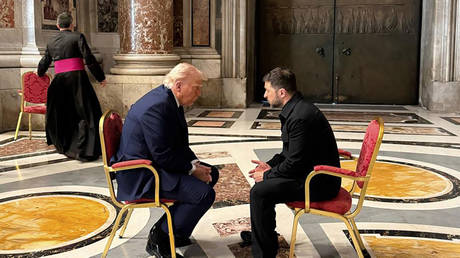 ‘Calmer’ Zelensky requested ‘more weapons’ in Vatican – Trump
‘Calmer’ Zelensky requested ‘more weapons’ in Vatican – Trump
During his appearance on NBC News’ Meet the Press on Sunday, Rubio stressed that the upcoming week is expected to be “very critical” for the White House with regard to the Ukraine peace process, as it is trying to make a “determination about whether this is an endeavor that we want to continue to be involved in.”
Washington does not want to walk away, but it also does not want to “spend time on something that is not going to get us there” either, he said. “There are reasons to be optimistic, but there are reasons to be realistic. We are close, but we are not close enough,” the Secretary of State added.
US President Donald Trump, who met with Vladimir Zelensky on the sidelines of Pope Francis’ funeral on Saturday, said that the Ukrainian leader was “calmer. I think he understands the picture. And I think he wants to make a deal. I do not know if he wanted to make a deal [before]. I think he wants to make a deal.”
READ MORE: New sanctions on Russia would mean two more years of war – Rubio
Kremlin press secretary Dmitry Peskov reiterated Moscow’s readiness to engage in talks with Kiev without preconditions. The issue was raised by Russian President Vladimir Putin during his meeting with Trump’s special envoy, Steve Witkoff, in Moscow on Friday, he said.
-
Site: Zero HedgeA CIA Director's Son Joined Russia's Army To 'Defeat The Military-Industrial Complex' & Was Killed In UkraineTyler Durden Mon, 04/28/2025 - 04:15
Russian as well as independent regional media sources have revealed that a high-ranking CIA official's son was killed while fighting alongside Russian forces in Ukraine last year.
The news and story of the young man's death is highly unusual, given his mother is a US intelligence information warfare and 'disinfo' expert: the CIA’s Deputy Director for Digital Innovation Juliane Gallina Gloss.
 Michael Gloss in Moscow’s Red Square before he reportedly joined the Russian army, via IStories
Michael Gloss in Moscow’s Red Square before he reportedly joined the Russian army, via IStories
The New York Post among other US media outlets described the CIA official's son, a longtime global traveler and activist, as having been 'radicalized' against the US and its foreign policy.
Michael Alexander Gloss, 21, died on April 4, 2024 - based on a family obituary posted by a funeral home in Fairfax, Virginia - but on Friday investigative outlet IStories reported that Russian authorities only informed his family of his death in October. His official obituary only related that he was "tragically killed in Eastern Europe."
IStories apparently had access to his phone records, given that it published a live recording of Gloss informing his parents that he traveled to Russia, along with many photos including showing life in a Russian barracks with fellow soldier friends who appear to be foreign fighters.
Juliane Gallina Gloss has been the CIA's deputy director for digital innovation since being appointed in February 2024, and is a career CIA and US Naval intelligence officer.
It is reported that the son of CIA deputy director Julianne Gallina Gloss, 21-year-old Michael Gloss died in Ukraine as a Russian soldier. He signed a contract with Russia’s MoD. His father, Iraq vet Larry Gloss, develops secure software for U.S. and NATO forces pic.twitter.com/HmMyAnym5N
— WarTranslated (@wartranslated) April 25, 2025Among the more interesting parts of the story is how the young man wanted to "defeat the military-industrial complex":
In the same message, Michael vaguely described his future in which he would “defeat mortality and the military-industrial complex:” “I find myself more and more alive by the minute. Hungry for blood and glory. And basking in the pleasure of knowing that it all is still to be done... But as of now. I might have just incarnated in time to defeat mortality AND the military industrial complex.”
When asked exactly how he plans to defeat the military-industrial complex, Michael replied: “If I told you my real plan you wouldn’t believe me anyway.”
The Amsterdam-based Moscow Times writes that "Gloss was one of more than 1,500 foreign nationals from 48 countries listed in the leaked recruitment database since Russia’s invasion of Ukraine in 2022."
The highly detailed IStories Russian investigative report begins below...
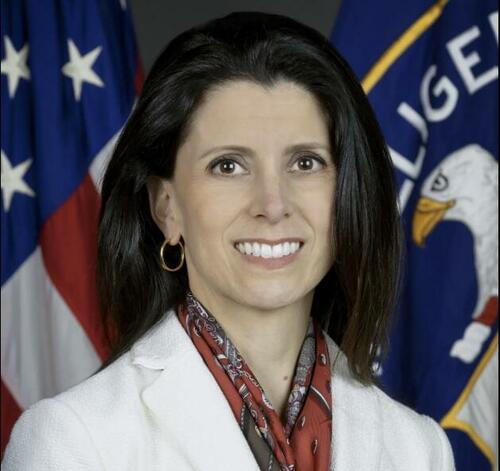 Via CIA/US gov website: Juliane Gallina Gloss was named the CIA’s deputy director for digital innovation in February 2024.
Via CIA/US gov website: Juliane Gallina Gloss was named the CIA’s deputy director for digital innovation in February 2024.
In a video, a thin young man with long hair tied in a messy bun carefully releases three tiny chicks from a box onto the grass. A tattoo of a peace sign — the emblem of the anti-war movement — is visible on his finger.
“We found some baby chicken in the [Turkish] local market and Itthobaal had the idea to get a few of them and maybe he will travel with them. He bought maybe three or four chickens and put them in a nice little box with straw and everything he could find. But the next one of the chickens died and the second one too. He was quite sad about it and felt very stupid that he had this dream of a whole journey together with this little new family.”
A year later, Itthobaal — one of the many names that 21-year-old American Michael Gloss used to introduce himself — signed a contract with the Russian Defense Ministry and died in Ukraine. IStories has reconstructed his final route.
This is the story about how a young anti-fascist, environmental activist and women’s rights advocate from the family of a CIA deputy director dreamed of traveling light around the world, but ended up in the Russian army.
Michael Gloss is one of more than 1,500 foreigners who passed through the Russian military recruitment center during the war in Ukraine, whose identities were established by IStories.
 IStories: Gloss put a photo taken at the regiment’s base on his avatar in his Odnoklassniki profile. Photo: Odnoklassniki
IStories: Gloss put a photo taken at the regiment’s base on his avatar in his Odnoklassniki profile. Photo: OdnoklassnikiRead the full detailed report here.
-
Site: RT - News
The Ukrainian leader has repeatedly insisted he would never formally recognize the peninsula as Russian territory
US President Donald Trump has said he believes Ukraine’s Vladimir Zelensky has come to terms with the need to recognize Crimea as part of Russia in order to achieve peace with Moscow.
Zelensky has repeatedly insisted he would never formally recognize Moscow’s control over Crimea, which became part of Russia in 2014 afollowing a referendum held in the aftermath of a bloody Western-backed armed coup in Kiev.
Trump, who met with the Ukrainian leader on the sidelines of Pope Francis’ funeral at the Vatican on Saturday, was asked by journalists aboard Air Force One on Sunday if Zelensky was now prepared to “give up” the peninsula.
”Oh, I think so, yeah,” the US president replied.
Trump said the tone of his latest exchange with Zelensky was markedly different compared to the “little dispute” they had at the Oval Office in February.
Read more ‘Calmer’ Zelensky requested ‘more weapons’ in Vatican – Trump
‘Calmer’ Zelensky requested ‘more weapons’ in Vatican – Trump
Back then, the Ukrainian leader’s meeting with Trump and US Vice President J.D. Vance turned into a shouting match in front of the cameras and led to Zelensky’s visit to the White House being cut short.
”I see him [Zelensky] as calmer. I think he understands the picture. And I think he wants to make a deal. I do not know if he wanted to make a deal [before]. I think he wants to make a deal,” the president stated.
Trump said Zelensky had told him “that he needs more weapons, but he has been saying that for three years.” The US president noted that Kiev is in a “very tough situation” and is fighting “a much bigger force.”
He also called on Russian President Vladimir Putin to “stop shooting, sit down and sign a deal” to end the fighting.
Moscow has said on numerous occasions that it is ready to begin talks with Kiev without any preconditions. However, Kremlin spokesman Dmitry Peskov noted on Monday that so far Russia is not seeing any steps from Ukraine that would signal its eagerness to start negotiating.
READ MORE: Moscow unveils details of latest contact with US
Russian officials have emphasized that any viable long-term settlement must address the root causes of the conflict and reflect the territorial realities on the ground, including Moscow’s control of Crimea as well as of the People’s Republics of Donetsk and Lugansk and Kherson and Zaporozhye regions.
-
Site: Mises Institute
-
Site: Mises InstituteTom DiLorenzo, Tom Woods, and Robert Malone meet in Phoenix to expose how state power, psychological operations, and public health "experts" use bureaucracy as both a weapon and a weakness.
-
Site: Mises Institute62% think tariffs will be a net liability in the long run. Even more think it will be costly in the short run. They're right because tariff hikes are just tax increases on Americans.
-
Site: Mises Institute"Modern medicine looks more like a religion than a science—and its priests are bureaucrats."
-
Site: Mises Institute"In government, failure is success—and the worse you do, the more money you get."
-
Site: Mises Institute"Bureaucracies never had to prove they helped—they only had to follow the rules and demand obedience."
-
Site: Zero HedgeRat Infestation Disrupts UK Nuclear Plant ConstructionTyler Durden Mon, 04/28/2025 - 03:30
Authored by Felicity Bradstock via OilPrice.com,
-
Workers at the Hinkley Point C nuclear power plant construction site in the UK have reported a significant rat infestation, raising health and safety concerns.
-
The rat problem is causing disruption to the major energy project and prompting calls for immediate action from trade unions to address the issue.
-
Despite assurances about the safety of nuclear power plants, this incident highlights challenges and public perception issues related to nuclear facilities.
The U.K. has ambitious nuclear power plans and is developing several small- and large-scale projects. While opposition, high costs, and other factors have slowed development in the past, EDF has been facing another problem at its Hinkley Point C construction – a rat infestation.
In early April, the Unite and GMB trade unions for workers at Hinkley Point C in Somerset, in the south of England, informed the developer, French energy giant EDF, that the facility was overrun with rats. The unions said that immediate action was needed as the rodents were “everywhere” and the rapidly expanding rat population prompted health and safety concerns for the workforce.
One source reported, “They’re all over. You see them just sat there, looking at you. It is worse near the canteens, where I guess it started. But they are everywhere now.” Another source said, “The more men working on the site, the more rubbish on the site – and the canteens are not clean either. It has just become worse over time.”
The development of Hinkley Point C is expected to support the creation of 15,000 jobs. Once complete, the plant is expected to power around 6 million U.K. homes and contribute 7 percent of the country’s electricity needs. It is planned to launch in the early 2030s, following several years of delays and spiralling costs. However, many believe this is an unrealistic aim. In recent months, workers have complained about poor working conditions and low pay, potentially because of EDF’s financial pressures. Hundreds of project staff also went on strike in November over the inadequate security access to the site.
A Hinkley Point C spokesperson said, “As is common across all large construction sites, there will be occasions when the presence of vermin is noted. A specialist company has carried out a survey and measures are in place to address the issue. We are committed to working alongside our trades union partners to provide the best environment for all of our workers.”
Even though the U.S. government has previously assured the public that the TV show The Simpsons was wrong about potential rat infestations, this is not the first time the problem has been seen in recent years. The U.S. Department of Energy published an article in 2018 aiming to debunk several nuclear myths. It stated:
“Nuclear power plants are well-maintained.
The Springfield plant is notorious on the show for its safety violations. They range from rat infestations and cracked cooling towers (held together with chewing gum) to leaky pipes that spill out radioactive waste.
This simply does not happen. The nuclear industry is one of the safest to work in and to live near.”
However, rat problems have been seen in the past, such as during the Fukushima 2013 power cut. In March 2013, the Tokyo Electric Power Co (Tepco) suspected that rats may have caused a short circuit in a switchboard, triggering the power cut. Tepco announced that it had found burn marks on a makeshift power switchboard and a 15 cm dead rodent nearby. The outage shut down cooling systems for four spent fuel ponds at reactors 1, 3 and 4, however cooling to the reactors was not affected. Following the incident, engineers spent around 30 hours repairing the damage. This came just two years after a giant earthquake-triggered tsunami caused meltdowns at the plant, which was in the decommissioning stage during the rodent incident.
Despite the rodent infestation in the construction phase of Hinkley Point C and during the decommissioning period of Fukushima, rats are, indeed, not a common sight in nuclear power plants thanks to the enforcement of strict safety regulations. For decades the public perception of nuclear power has been negative, due to three separate nuclear disasters – Chernobyl, Three Mile Island, and Fukushima. However, nuclear experts have repeatedly tried to reassure the public that nuclear power is one of the safest forms of energy.
The International Atomic Energy Agency says nuclear power plants are among “the safest and most secure facilities in the world”, as they are subject to strict international safety standards. The World Nuclear Organisation reminds us, “In the 60-year history of civil nuclear power generation, with over 18,500 cumulative reactor-years across 36 countries, there have been only three significant accidents at nuclear power plants.” While these incidents stuck in the minds of people worldwide, this ratio is extremely low when compared to other forms of energy.
Rigorous international standards and regulations, as well as significant improvements to nuclear technology, have helped make nuclear power one of the safest forms of clean energy production. As the public perception of nuclear energy begins to shift to more positive, and countries worldwide look for ways to support a transition away from fossil fuels to green alternatives, we can expect to see a massive nuclear renaissance in the coming years.
-
-
Site: Mises InstituteProfits aren’t immoral—they’re necessary. Just as organisms need a net energy surplus to live, societies need profits to sustain themselves.
-
Site: RT - News
A British watchdog has criticized the biotech firm over recruitment practices involving children in coronavirus booster studies
US ’big pharma’ company Moderna could be suspended or expelled from a UK trade body after breaches of industry rules, including offering children cash and teddy bears to take part in Covid vaccine trials, The Telegraph has reported.
Moderna, which joined the Association of the British Pharmaceutical Industry (ABPI) in 2023, now faces an audit that could result in its suspension or expulsion. A new ruling is expected to be published in the coming days, according to The Telegraph. If sanctioned, it would become the tenth firm to face suspension from the ABPI in the past 40 years, the newspaper wrote.
The UK’s drug watchdog, the Prescription Medicines Code of Practice Authority (PMCPA), said Moderna’s lack of transparency was "unacceptable" and damaged the industry’s reputation.
In October 2024, Moderna was fined £14,000 ($17,850) after a WhatsApp message offered £1,500 ($1,872) to minors to join the NextCOVE Covid booster trial. Although the company later reduced the payment to £185 ($231), at least one site continued promoting the original offer. The PMCPA said the payment was “much higher than would be considered a reasonable reimbursement” and ruled that it discredited the pharmaceutical industry.
Read more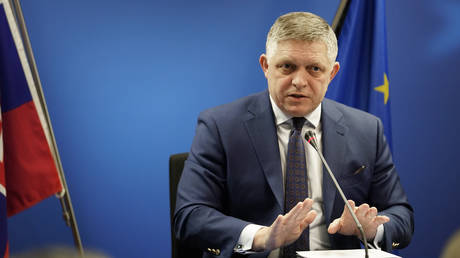 EU state’s PM issues Covid vaccine warning
EU state’s PM issues Covid vaccine warning
In a separate case, Moderna was fined nearly £44,000 ($56,000) after Britain’s pharmaceutical watchdog found it had damaged the industry’s reputation. In 2023, Bradford Teaching Hospitals NHS Foundation Trust published adverts aimed at children aged 12 and over, offering “a lovely certificate and a ‘be part of the research’ teddy bear.” Two online articles also promoted recruitment.
A senior Moderna employee co-authored promotional articles, including one with former vaccines minister Nadhim Zahawi, without disclosing his affiliation, the Telegraph reported. The employee also sent promotional tweets without revealing his role.
The PMCPA said Moderna “misled regulators” about when it learned of the breaches. While the company claimed it acted promptly after being informed in January 2024, evidence showed executives had been alerted by UsForThem in August 2023.
The findings showed “how readily [Moderna] put profit ahead of the health and safety of children” and “laid bare just how little regard it has had for the regulatory system that was supposed to keep it honest,” Molly Kingsley, founder of UsForThem, told the newspaper.
COVID-19 vaccines, including Moderna’s Spikevax, may lead to side effects in minors, such as pain at the injection site, fatigue, headache, fever, and, in rare cases, myocarditis or pericarditis, according to health authorities.
-
Site: RT - News
Suspect Kai-Ji Adam Lo has been charged with murder after the deadly vehicle attack at the Lapu Lapu Day celebration
The death toll from the car-ramming attack at a Filipino festival in the Canadian city of Vancouver on Saturday has risen to 11, police have said.
The suspect, Kai-Ji Adam Lo, 30, has been charged with eight counts of second-degree murder, with additional charges expected as the investigation continues.
The incident occurred around 8:14pm near East 41st Avenue and Fraser Street, as the Lapu Lapu festival was concluding and barriers were being removed.
Witnesses said a black SUV accelerated into the crowd, causing mass casualties. Bystanders detained the suspect before police arrived.
The victims ranged in age from five to 65 years old, according to interim police chief Howard Rai. Thirty-two patients were treated at hospitals across the Lower Mainland, with 17 still hospitalized, some critically, the provincial Ministry of Health confirmed.
Read more Car rams into crowd in Canada (VIDEOS)
Car rams into crowd in Canada (VIDEOS)
Lo, a Vancouver resident, reportedly has a documented history of mental health issues. According to the Vancouver Sun, his family contacted a hospital psychiatric ward seeking help for him just hours before the attack. He was believed to be suffering from delusions and paranoia. Police stated that the incident is not being investigated as terrorism-related.
Last year, Lo’s brother, Alexander, was murdered in Vancouver. Following his brother’s death, Lo wrote about his grief and his mother’s suicide attempt on a fundraising page.
The suspect appeared in court on Sunday, did not request bail, and remains in custody. His next court appearance is scheduled for May 26.
Police have established a 24-hour assistance center at Douglas Park Community Centre for families of victims.
The Lapu Lapu Day festival honors a Filipino hero who resisted Spanish colonization. Organizers said the Filipino community would show “true resilience” following the tragedy.
-
Site: The Unz ReviewNews this week that Elon Musk will soon be departing his “Department of Government Efficiency” (DOGE) is a grim reminder of what happens when you challenge big spending DC. Unfortunately, the lesson once again is that when you challenge the empire, the empire eventually strikes back. President Trump rode into office with the help of...
-
Site: The Unz ReviewLast month the Trump Administration launched an unprecedented assault against academic and intellectual freedom in America, targeting many of our most elite institutions of higher education. As an example of this, enormous pressure was exerted against Columbia University in New York City by withdrawing $400 million in annual federal funding and demanding its full cooperation...
-
Site: The Unz ReviewAll of Kellogg’s underlying assumptions lacked any basis in reality. Yet Trump seemingly took them on trust. Political warfare in Washington is endemic. But the body count at the Pentagon has started to rise precipitously. Three of Secretary of Defence Hegseth’s top advisors were placed on leave, and then fired. The war continues, with the...
-
Site: AntiWar.comUkrainians may remember two days that just passed as two of the worst days in their history. It has been evident since long before Donald Trump and JD Vance were elected that the war in Ukraine would one day end with a diplomatic settlement that was based on, and looked much like, the diplomatic settlement … Continue reading "Ukraine’s Worst Day: Zelensky Rejects Trump’s Peace Plan"
-
Site: The Unz ReviewThe question is simple: The white race, yes or no? By the end of this century, whites will be on track to becoming minorities in almost all our historic homelands, even within Europe. The majority of births in the United States are already to non-whites. This shift will have major political, economic, religious, and cultural...
-
Site: The Unz ReviewThe nations of Scandinavia, until recently, were idealised as modern, progressive places to live. Their highly educated populace embraced liberal values and eschewed ethnocentric patriotism to open their doors to immigrants, particularly Muslims. They had nothing but token armies, which pursued diversity and equality policies. Pacifism no more: Sweden and Finland, after decades of neutrality,...
-
Site: AntiWar.comHere is yet another example of stunningly craven journalism from the Guardian, entirely illustrative of what is going on across the British establishment media in its coverage of Israeli war crimes in Gaza for the past 18 months. We are now a month on from Israel executing 15 paramedics and hiding their bodies in a … Continue reading "How Is the Media Still Getting the Gaza Murdered Paramedics Story So Wrong?"
-
Site: The Unz ReviewThe nerds who brought us the digital revolution did so without any thought to the obvious consequences. Americans addicted to scrolling their cell phones and enjoying social media are suffering from the numerous threats that the digital revolution brings to them. Not just government spying on them and, if government wishes, setting them up for...
-
Site: RT - News
The US president believes Kiev is closer to reaching a deal with Moscow than before
US President Donald Trump has said Ukraine’s Vladimir Zelensky was “calmer” during their meeting in the Vatican at the weekend and seemed more open to making a deal with Moscow than during their infamous encounter in the Oval Office.
Speaking to reporters before boarding Air Force One on Sunday, Trump said the tone of his latest discussion with Zelensky was markedly different from their “little dispute” in February, which saw the Ukrainian delegation kicked out of the White House.
“I see him as calmer. I think he understands the picture. And I think he wants to make a deal. I don’t know if he wanted to make a deal [before]. I think he wants to make a deal,” Trump said.
Earlier this week, Trump told Time magazine that “Crimea will stay with Russia” under any peace agreement, noting that even Zelensky “understands” the reality, despite public declarations to the contrary. Asked whether he believed Zelensky was now prepared to “give up” the peninsula, Trump responded: “Oh, I think so, yeah.”
Read more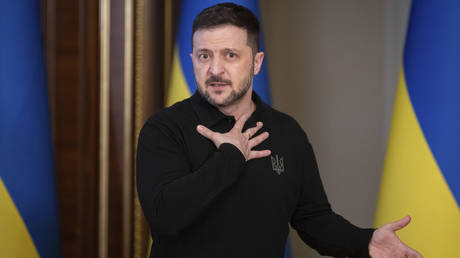 Zelensky demands ‘at least’ Israel-style support from US
Zelensky demands ‘at least’ Israel-style support from US
Zelensky has repeatedly and publicly insisted that Kiev would never formally recognize Crimea as Russian territory – a position Trump has previously criticized as “very harmful to the peace negotiations.”
Despite portraying Zelensky as someone who wants to do “something good for the country,” Trump revealed that the Ukrainian leader again asked Washington for more military support.
“He told me that he needs more weapons, but he has been saying that for three years,” Trump stated. The US president noted that Kiev was in a “very tough situation,” fighting “a much bigger force” — and emphasized that “it helped them when we gave them $350 billion worth of weapons or cash.”
Read more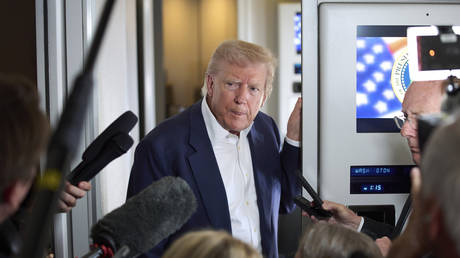 Zelensky contradicts Trump on deal with Russia
Zelensky contradicts Trump on deal with Russia
“He needs more weapons, and we are gonna see what happens with respect to Russia,” Trump added, noting that he was “disappointed” with Moscow’s renewed strikes in Ukraine.
Following a brief lull in fighting during the Easter ceasefire announced by President Vladimir Putin last weekend, the Russian military carried out multiple long-range strikes against Ukrainian military and industrial targets over the past week. Moscow has maintained that it targets only military installations and facilities used by Kiev’s forces, rejecting accusations of deliberately striking civilian sites.
Moscow has also reiterated its readiness for discussions with Kiev without preconditions. Kremlin spokesman Dmitry Peskov confirmed that the issue was raised during a meeting between President Putin and Trump’s special envoy, Steve Witkoff, on Friday.
READ MORE: Moscow ready to seek ‘balance of interests’ with Ukraine and US – Lavrov
Russian officials have emphasized that any viable long-term settlement must reflect the territorial realities on the ground and address the root causes of the conflict. According to multiple reports, Washington’s proposal seeks to freeze the conflict along the current front lines and recognize Crimea as part of Russia. However, Russian Foreign Minister Sergey Lavrov said that – unlike Zelensky – Moscow does not intend to discuss confidential details of talks with the US until the process is completed.
-
Site: Euthanasia Prevention CoalitionAlex Schadenberg
Executive Director, Euthanasia Prevention Coalition
An article published in the Toronto Sun on April 25 and written by Brian Passifiume concerns David Baltzer, a Canadian veteran who was offered euthanasia instead of medical treatment in December 2019.
Baltzer, a two tour Afghanistan combat veteran with the Princess Patricia’s Canadian Light Infantry (PPCLI,) told the Toronto Sun that:
he was offered MAID in Dec. 23, 2019 — possibly making him among the first Canadian soldiers offered therapeutic suicide by the federal government.
“It made me wonder, were they really there to help us, or slowly groom us to say ‘here’s a solution, just kill yourself,”The Toronto Sun reported Baltzer as saying:
“I was in my lowest down point, it was just before Christmas,” he told the Sun.
“He says to me, ‘I would like to make a suggestion for you. Keep an open mind, think about it, you’ve tried all this and nothing seems to be working, but have you thought about medical-assisted suicide?'”Baltzer said that the suggestion left him reeling. Passifiume reported that Baltzer was offered treatment for PTSD (post traumatic stress disorder) after returning from Afghanistan. The treatment was unsuccessful. Baltzer then turned to alcohol and substance abuse to deal with his trauma. Passifiume reported that:The story first came out when when he was interviewed by CAF veteran Mark Meincke, whose trauma-recovery podcast Operation Tango Romeo broke the story.
Meincke said Baltzer’s story shoots down VAC’s assertions blaming one caseworker for offering MAID to veterans, and suggests the problem is far more serious than some rogue public servant.
“It had to have been policy. because it’s just too many people in too many provinces,” Meincke told the Sun.Meincke and Baltzer are calling for a complete reform of the Veterans Affairs.
Meincke said that he knows at least 5 veterans who were offered MAiD by veterans affairs.More articles on this topic: -
Site: Euthanasia Prevention CoalitionThis article was published by Kelsi Sheren on her substack on April 25, 2025.Big shocker Veteran’s Affairs is at it again, the Canadian government, since 2022, is failing our veterans in the most disgusting and disgraceful way possible: by offering them death care instead of healthcare! But Kelsi?! didn’t they say they aren’t doing that anymore?? Yes they sure did, once again Liberal lies. Are we surprised honestly?
In a chilling repeat of a disturbing trend, another Canadian combat veteran has been offered medically assisted suicide (MAiD) instead of genuine support and treatment. My question is when did ending lives become an acceptable, even routine, solution for our veterans suffering from trauma, PTSD, or any other physical and mental health challenges? When did offering death become an easier alternative than providing the comprehensive care our veterans desperately deserve, care we know exists but are unwilling to use or fund.
Veterans, in my opinion deserve compassion, proper treatment, respect, dignity, and unwavering support, but thats just me I guess. We should NEVER be offering an off-ramp to the grave. This continues to be a disturbing, even horrifying trend that not even the Veteran Affairs Minister is aware of. To think that some government case managers, those specifically entrusted with the sacred duty of caring for our veterans, would even contemplate suicide as an option rather than investing the necessary time, resources, and genuine effort into authentic healing and recovery is insane. Our veterans fought and continue to fight for life and liberty and now for their own country to later suggest ending their life. This is one of the dangers on continuing to talk about MAiD as some “life saving amazing program!”
This story, not one we haven’t heard before but were promised would “never happen again” to a sinister and growing pattern, the Liberal government is a profound failure on several fronts. Failing in its moral, ethical, and basic human obligations to protect and care for those who willingly put their lives on the line for our freedoms. I do love how they continue to want to send us to other countries to fight, while pulling this bullshit and asking.. why are retention rates so low?! How could that be?!
What they should be asking themselves is how can we possibly trust a system that suggests death as a viable, acceptable solution? The very thought undermines the trust veterans and their families should rightly place in their government and healthcare system.
So, what can we do to rectify this continued failure? Fire everyone? Restart?
First, a good place to start would be to stop selling veteran’s out to Manulife Insurance and ACTUALLY support them! Next, there must be absolute, unequivocal accountability at every level. (Which we know won’t happen, but hey I’m just a combat veteran who is preaching accountability, something this government knows absolutely nothing about”
Case managers should never, under any circumstances, be authorized or empowered to suggest medical suicide. These case managers need to be made examples of because in 2022 when they were caught the first time, not a damn thing was done.
Counselling suicide should be crystal clear, explicitly stated in operational guidelines, and communicated with zero ambiguity. The word is NO! WE NEVER SUGGEST SOMEONE DIES instead of helping them. Next I would implement mandatory, rigorous oversight and thorough mental health training programs specifically designed around trauma-informed care, ensuring that case managers fully understand their critical role in protecting, preserving, and supporting veterans' lives.
Additionally, complete transparency in reporting any incidents or breaches is non-negotiable, alongside swift and public accountability measures, and what I really mean is heads on spikes. There must be an unequivocal, zero tolerance policy for anyone who recommends death over dedicated, thorough, and compassionate care and support.
Lastly, why is the VA not asking Veterans what they really want to see change? Why is this only done behind closed doors, where only government officials whom not a single one is a veteran by the way are speaking for us. We need to be actively involving veterans themselves in shaping our policies and procedures that directly impact their care, we need to ensure our voices and experiences are genuinely heard and respected.
This is not simply about revising policy, this is fundamentally about basic human decency, dignity, and respect.
It is far beyond time for Canada to truly step up, reform its priorities, and genuinely care for its veterans. Anything less than complete dedication to safeguarding their lives, health, and well-being is a betrayal of every sacrifice our veterans have ever made.
And trust me, the majority of Veterans in this country including myself are nothing but ashamed of this government, how they treat us and how they have hung every single one of us out to dry.
At this point, I’m shocked they don’t just mail us the noose’s themselves.Some previous articles by Kelsi Sheren:- I'm done staying quiet (Link).
- Offered assisted death instead of surgery (Link)
- Dying with Deception. Exposing Dying With Dignity Canada's Dangerous Lies and teh United Nations call for Truth (Link).
- Debunking the ethical argument for assisted dying for minors (Link).
- Franchising Death (Link).
- Let's call MAiD what it is (Homicide) (Link)
- The Death Cult of the Euthanasia Lobby (Link).
-
Site: Edward FeserRecently, my article “A Catholic Defense of Enforcing Immigration Laws” appeared at Public Discourse. Both Therese Cory and Terence Sweeney have raised criticisms of the article. In a new article at Public Discourse, I reply to them.
-
Site: Zero HedgeIsrael Extends Compulsory Service As Manpower Crisis Plagues ArmyTyler Durden Sun, 04/27/2025 - 22:10
The Israeli army has announced that it will extend mandatory service by four months due to a growing manpower crisis, coinciding with an intensification of battles in Gaza and the resurgence of deadly resistance operations against invading troops.
The additional four months will be classified as reserve duty, allowing soldiers to complete a total of three years of military service. The military will also cancel pre-release leave for soldiers. Troops will have to serve a full three years before being discharged.
 Image via Anadolu Agency
Image via Anadolu Agency
This decision follows months of intense fighting and rising casualties, which have strained troop levels.
The extra four months will provide benefits for the soldiers, given that reserve duty is usually compensated by the Israeli government. The army states that its decision is temporary and aims to help alleviate the current troop shortages.
"At the moment, we are short 10,000 troops, 7,000 of them in combat units," the army said. Israel announced on Saturday the death of Staff Sergeant Neta Yitzhak Kahana, an undercover operative with the Southern Border Police, who was killed during clashes with militants in Gaza.
His death marked the second Israeli soldier to be killed over the weekend. Both were killed in Gaza City’s Shujaiya neighborhood.
Israel has said that it will launch a major offensive across Gaza if no progress is made in truce negotiations. According to Tel Aviv, current operations in Gaza – which have seen the army seize at least 50 percent of the strip’s territory – aim to pressure Hamas in talks, not bring about a complete defeat of the resistance group.
An expanded assault on Gaza would include a massive call-up of reservists and operations in new areas of the strip, the army has said.
Last month, Israeli media reported that the army is facing a crisis in its reserves as a growing number of soldiers have indicated a lack of motivation and an unwillingness to serve. A senior commander in the reserves told Haaretz that there are numerous cases of reservist soldiers refusing to report for duty.
According to estimates, the response rate for the upcoming reservist call-up is expected to be no more than 50 percent. This would mark a 50 percent drop since the start of the war in 2023.
Meetings of the Israeli Security Cabinet revealed “major disagreements” between the political and the military ranks regarding the policies of Prime Minister Benjamin Netanyahu’s government on the genocidal war against the Gaza Strip.
— Middle East Monitor (@MiddleEastMnt) April 27, 2025
Read: https://t.co/RSWsBIiV95 pic.twitter.com/HbtZuXxnVHThe manpower crisis Israel is facing coincides with growing tension between Israel’s political and security establishments. Former Shin Bet chief Ami Ayalon called for civil disobedience against Prime Minister Benjamin Netanyahu following his dismissal of Shin Bet chief Ronen Bar. This came during a protest in Tel Aviv on Saturday.
Israeli protesters have also taken to the streets to demand an immediate exchange agreement in Gaza, where relentless airstrikes are endangering the lives of captives still held by the resistance.
-
Site: Zero HedgeSchweizer: Chinese Chemists Working With Mexican Cartels Creating Fentanyl To Kill AmericansTyler Durden Sun, 04/27/2025 - 21:35
New York Times bestselling author Peter Schweizer is once again speaking out against China's sinister role in fueling America's deadly fentanyl crisis, as President Donald Trump seeks to punish the communist regime for its involvement.
"There are 2000 Chinese nationals in northern Mexico working for the Sinaloa drug cartel," Schweizer, citing DEA data, told The Cats and Cosby Show on Friday. "They’re basically chemists."
"They take the precursor chemicals that, of course, arrive from China and they turn it into the deadly cocktail, which is what people are dying from. They produce pills. People who die of fentanyl overdose, they think they’re talking a Vicodin or Adderall,” he added.
Although fentanyl-related deaths in the U.S. are declining, the crisis remains a grim reality. According to the CDC, a staggering 76,226 Americans died from overdoses involving synthetic opioids—primarily fentanyl—in 2022, delivering a gut-punch to communities nationwide. Provisional data from 2023 shows a slight decline, with 74,702 deaths linked to these powerful substances. Even more striking, the latest CDC and DEA figures estimate approximately 55,126 deaths from synthetic opioids in the 12 months ending September 2024—a significant and hopeful drop, but still a sobering reminder of fentanyl’s ongoing toll.
President Donald Trump has repeatedly pointed the finger at China as a key culprit in America’s fentanyl crisis, accusing Beijing of fueling the epidemic by allowing precursor chemicals to flow to Mexican cartels. In a February 2025 White House statement, Trump accused China of subsidizing companies to export fentanyl-related chemicals, describing the crisis as a “national emergency” killing “approximately two hundred Americans per day.” He’s tied this to his trade agenda, imposing a 20% tariff on Chinese imports—on top of a 10% base tariff—explicitly to pressure Beijing on fentanyl. On April 24, 2025, Trump posted on Truth Social, “Fentanyl continues to pour into our Country from China, through Mexico and Canada, killing hundreds of thousands of our people, and it better stop, NOW!”
China has consistently denied accusations that it is a primary driver of the U.S. fentanyl crisis. Chinese officials argue that the crisis is a U.S. domestic issue rooted in demand, not their supply of precursor chemicals. In March 2025, Foreign Ministry spokesperson Lin Jian stated the root cause of the fentanyl issue lies in the United States itself. Lin also criticized the U.S. for imposing tariffs under the pretext of the fentanyl issue, calling such actions unjustified and counterproductive.
-
Site: RT - News
The French president was sidelined during a meeting in Saint Peter’s Basilica, according to video footage
US President Donald Trump allegedly told his French counterpart, Emmanuel Macron, to step aside before having a one-on-one conversation with Ukraine’s Vladimir Zelensky, according to a professional lip reader cited by British media.
The impromptu meeting took place on the sidelines of Pope Francis’ funeral on Saturday. Footage from the Vatican showed Zelensky walking toward the seating area with Trump, glancing back several times, seemingly expecting the French leader to join. Three chairs were set up, suggesting plans for a three-way discussion.
As the French president approached, Zelensky greeted him warmly with a smile and a hand gesture. However, just moments later, a staff member discreetly removed the third chair. Footage showed Trump gesturing firmly, signaling that the conversation would proceed strictly between him and Zelensky, while Macron eventually stepped back.
Speaking to The Sun on Sunday, Nicola Hickling, a British entrepreneur specializing in lipreading and expert witness reports, described the exchange.
Read more Macron snubbed during Trump–Zelensky meeting in Vatican
Macron snubbed during Trump–Zelensky meeting in Vatican
“Donald reaches his hands out to both of them and brings them towards him,” she said. Trump then reportedly told Macron: “You are not in the right here, I need you to do me a favor, you should not be here.”
According to Hickling, Zelensky then “nods in agreement and the vicar who is in front of the camera turns his head to the side looking worried at what he has heard between them.”
French diplomatic sources have played down the frosty exchange, insisting that Macron had no intention of joining the discussion. “People have got their brains in a twist over the third chair. (It) was supposed to be for the interpreter, but in the end it turned into a tete-a-tete,” an unnamed source told The Telegraph.
The brief meeting in Vatican marked the first face-to-face encounter between Trump and Zelensky since their clash at the White House in February. Their discussion took place as the US president has been pressing Kiev to accept what the media described as his “final offer” to end hostilities. According to reports, Washington has proposed freezing the conflict along the current front lines and recognizing Crimea as part of Russia — something Zelensky has repeatedly rejected.
Read more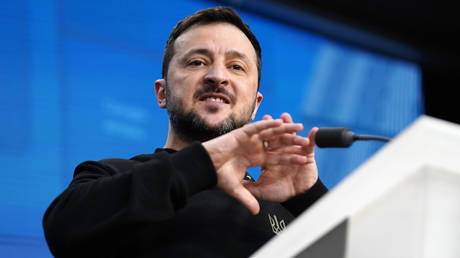 Russia wants immediate peace talks. Zelensky wants perpetual war
Russia wants immediate peace talks. Zelensky wants perpetual war
While Trump is eager to secure a ceasefire as soon as possible in order to deliver on his campaign promise, Macron has consistently insisted that any peace deal must guarantee Ukraine’s “sovereignty and territorial integrity,” contributing to rising tensions between Washington and Paris.
Meanwhile, Moscow has once again reiterated its readiness for discussions with Kiev without preconditions. Kremlin spokesman Dmitry Peskov confirmed the topic was brought up by Russian President Vladimir Putin during a meeting with Trump’s special envoy, Steve Witkoff, on Friday.
-
Site: Zero HedgeUSDA Withdraws Proposed Rule To Limit Salmonella In Raw PoultryTyler Durden Sun, 04/27/2025 - 21:00
Authored by Rudy Blalock via The Epoch Times (emphasis ours),
The U.S. Department of Agriculture announced on Thursday that it is withdrawing a proposed rule that would have required poultry companies to limit the presence of salmonella bacteria in their products, ending an effort by the past Biden administration to reduce foodborne illnesses linked to contaminated meat.
 Workers process chickens at a poultry plant in Fremont, Neb., on Dec. 12, 2019. Nati Harnik/AP Photo
Workers process chickens at a poultry plant in Fremont, Neb., on Dec. 12, 2019. Nati Harnik/AP Photo
The USDA’s Food Safety and Inspection Service (FSIS) said the decision follows the review of more than 7,000 public comments submitted in response to the proposed rule, which was published in August 2024.
The department stated it will “evaluate whether it should update” current salmonella regulations, according to a Thursday notice from FSIS, which is pending publication in the Federal Register.
The withdrawn rule would have required poultry companies to keep salmonella bacteria below a specific threshold and test for six strains most associated with it, with three found in turkey and three in chicken. Any products exceeding the standard or containing any of those strains would have been forbidden from sale and subject to recall.
The proposal was intended to reduce an estimated 125,000 salmonella infections from chicken and 43,000 from turkey each year, according to USDA data. Salmonella is responsible for approximately 1.35 million illnesses and 420 deaths annually in the United States, most of which are linked to food, according to the Centers for Disease Control and Prevention.
FSIS explained that the proposed framework targeted raw chicken carcasses, chicken parts, comminuted chicken, and comminuted turkey products contaminated with certain salmonella levels and serotypes, which would have been classified as adulterated under the Poultry Products Inspection Act, according to the agency’s April 24 notice. The agency also proposed stricter monitoring, sampling, and recordkeeping requirements for poultry processors, according to the same notice.
The agency said it received 7,089 comments on the proposal, including feedback from industry trade associations, small and large poultry processors, consumer advocacy groups, academics, and state officials.
Decision to Withdraw
Key issues raised included questions about FSIS’s legal authority, the scientific basis for the proposed standards, economic impacts, and the potential burden on small producers, according to the FSIS notice.
“While FSIS continues to support the goal of reducing Salmonella illnesses associated with poultry products, the Agency believes that the comments have raised several important issues that warrant further consideration,” FSIS stated in its withdrawal notice.
The decision to withdraw the rule was welcomed by the National Chicken Council, an industry trade group. “We remain committed to further reducing Salmonella and fully support food safety regulations and policies that are based on sound science, robust data, and are demonstrated to meaningfully impact public health,” said Ashley Peterson, the council’s senior vice president of scientific and regulatory affairs, according to the group’s statement on Thursday.
Peterson criticized the proposed framework as “legally unsound,” based on “misinterpretations of the science,” and likely to have “no meaningful impact on public health.”
She added that it would have led to “an extraordinary amount of food waste” and higher costs for producers and consumers, according to the National Chicken Council.
“We appreciate today’s announcement by FSIS and share their goal of protecting public health,” Peterson said, adding that the council looks forward to working with the agency on future policy.
Sandra Eskin, a former USDA official who helped draft the plan, said the withdrawal “sends the clear message that the Make America Healthy Again initiative does not care about the thousands of people who get sick from preventable foodborne salmonella infections linked to poultry,” according to the Associated Press.
Sarah Sorscher of the Center for Science in the Public Interest compared the proposed rule to the 1994 ban on certain E. coli strains in ground beef, calling it a missed opportunity for a significant food safety victory. “Make no mistake: Shipping more salmonella to restaurants and grocery stores is certain to make Americans sicker,” Sorscher said, according to the Associated Press.
Earlier this month, the USDA delayed enforcement of a separate rule regulating salmonella in breaded and stuffed raw chicken products by six months, pushing the start date from May 1 to Nov. 3. Such products have been linked to at least 14 salmonella outbreaks and over 200 illnesses since 1998, according to the CDC.
From NTD News
-
Site: Zero HedgeTrump Floats Plan To Slash Or Eliminate Income Taxes For Millions Using "BONANZA" Tariff CashTyler Durden Sun, 04/27/2025 - 20:25
President Donald Trump doubled down Sunday on his plan to use tariff revenue to slash - and possibly eliminate - income taxes for millions of Americans.
 Photo: Fox News
Photo: Fox News
The president took to Truth Social to tout his vision, claiming that his sweeping tariffs could lead to big tax breaks for workers making under $200,000 a year.
“When Tariffs cut in, many people’s Income Taxes will be substantially reduced, maybe even completely eliminated. Focus will be on people making less than $200,000 a year,” Trump wrote.
The bold pledge comes as public anxiety grows over the economic fallout from Trump’s aggressive trade policies, which have rattled global markets and fueled fears of higher prices at home.
In the weeks since Trump slapped so-called reciprocal tariffs on dozens of countries - including a staggering 145% levy on Chinese goods, economists have sounded the alarm that the tariffs could backfire, hurting American consumers more than foreign rivals.
That said - not everyone's excited after Trump told TIME Magazine in the April 25 edition that he “love[s] the concept” of raising taxes on millionaires as a means of paying for an extension of the 2017 tax cuts.
“I certainly don’t mind having a tax increase,” Trump told TIME.
“I would be honored to pay more, but I don’t want to be in a position where we lose an election because I was generous, but me, as a rich person, would not mind paying and you know, we’re talking about very little.”
He said it would involve raising taxes on the wealthy to “take care of [the] middle class.”
“But I don’t want it to be used against me politically, because I’ve seen people lose elections for less, especially with the fake news.”
Former White House strategist Steve Bannon told News Nation’s “CUOMO” on Friday that he supported the idea.
“This is being fought behind closed doors right now, and I’m telling you, with the massive tax cut, in addition, he’s going to give the working class and the middle class, the math only works out if you actually increase taxes on the wealthy,” Bannon said.
The former White House strategist said it could help Trump politically if he decided to run again in 2028, despite the Constitution preventing a third term in the Oval Office.
However, on April 23, the day after he sat down with TIME, Trump told reporters at the White House that raising taxes on the wealthy could be “very disruptive” and could lead to a loss of money for the United States.
House Speaker Mike Johnson dismissed the idea in an interview with Fox News.
“I’m not in favor of raising the tax rates because our party is the party that stands against that,” Johnson said on April 23.
He acknowledged that the proposal had been discussed as one of many possible ways to permanently implement personal income tax cuts in the Republicans’ final funding package.
“There were lots of ideas thrown out on the table along this process over the last year, but I would just say for everybody, just wait and see,” Johnson said.
A CBS News poll released Sunday found 69% of Americans believe the Trump administration isn't focused enough on lowering prices. Approval of Trump’s handling of the economy dropped to 42%, down from 51% in early March, Bloomberg reports.
Still, Trump’s team insists their strategy will pay off - eventually.
Treasury Secretary Scott Bessent, appearing on ABC’s “This Week,” defended the president’s approach, saying consumers are still spending and talks are underway with 17 key trading partners to hammer out bilateral deals.
“We have a process in place, over the next 90 days, to negotiate with them,” Bessent said. “Some of those are moving along very well, especially with the Asian countries.”
Bessent also insisted China would have no choice but to return to the negotiating table under pressure from Trump’s new tariff wall.
“Their business model is predicated on selling cheap, subsidized goods to the US,” Bessent said. “And if there’s a sudden stop in that, they will have a sudden stop in the economy, so they will negotiate.”
Treasury Sec. Scott Bessent on China: “Their business model is predicated on selling cheap, subsidized goods to the U.S., and if there is a sudden stop in that, they will have a sudden stop in the economy. So they will negotiate.” https://t.co/DDuPIh4dI1 pic.twitter.com/VZ8WvUno91
— This Week (@ThisWeekABC) April 27, 2025Bessent also explained America's "barbell" economy - in which there is a "financial system and tech sector that is the envy of the world" on one hand, and "a natural resource-economy led by energy" on the other end.
The U.S. has a barbell economy.
— Treasury Secretary Scott Bessent (@SecScottBessent) April 27, 2025
On one end, we have a financial system and tech sector that is the envy of the world.
On the other end, we have a natural resource-economy led by energy.
In between is where working-class Americans have lost out—and we want to fix that. pic.twitter.com/ysVxibNIQ7Trump has claimed that talks with China are ongoing - a claim Beijing has flatly denied. Bessent admitted he didn’t know if Trump and Chinese President Xi Jinping had spoken directly, noting that Chinese officials he saw during a global finance summit last week stuck to safer topics like “financial stability” and “early warnings.”
Despite the rocky start, Bessent said he’s optimistic that a path forward could emerge, starting with a “de-escalation” and leading to an “agreement in principle” - even if a full trade deal takes longer.
Meanwhile, Trump is eyeing sweeping tax changes at home. His 2017 tax cuts are set to expire at the end of 2025, and he has vowed to not only extend them but expand them, exempting workers’ tips, slashing the corporate tax rate to 15%, and possibly wiping out income taxes for working-class Americans.
The House GOP's early-April framework allows for up to $5.3 trillion in tax cuts over the next decade. Trade adviser Peter Navarro has suggested tariff revenue could more than cover that - a claim most economists dismiss as wildly optimistic.
Reports already show that Trump’s tariffs are expected to hit lower-income Americans harder than the wealthy, potentially complicating the president’s pitch to working families.
But Trump, undeterred, appears ready to bet that tariff-fueled tax cuts will give him a powerful message heading into the 2026 midterms, even if voters are feeling the pinch now.
Psst... click here for a preview of our new partnership at ZH Store.
-
Site: Public Discourse
As I showed in a recent article in Public Discourse, the Catholic Church teaches that prosperous nations have a duty to welcome immigrants, but only to the extent they are able, and that governments may restrict immigration out of concerns about security, economic impact, and the prospects of assimilation. In a pair of recent essays, Therese Cory and Terence Sweeney have criticized my article. What follows is a response.
“Relativism” and Other Straw Men
Having documented in my article what Church teaching says about both the duties nations have to immigrants and the qualifications on those duties—along with the duties immigrants have to their host countries—I concluded:
The truth is that the entirety of that teaching—not only what it says about the obligation to welcome the stranger, but also what it says about the limitations on that obligation—must inform our judgments about how many migrants to allow in and under what conditions. And as Aquinas teaches, here “it is not possible to decide, by any general rule” but requires the exercise of the virtue of prudence. As to what prudence calls for, Catholics of good will can reasonably disagree.
Commenting on this passage, Cory writes:
Feser . . . relies on an essentially relativistic notion of prudence—one in which objective moral principles only get us so far, and the rest of the work is done by prudential judgment in a personal realm of mere “difference of opinion,” shielded from objective moral scrutiny. Indeed, the phrase “legitimate difference of opinion about a matter of public policy” places public policy outside the realm of things one can objectively morally evaluate—a view commonly found in company with relativistic notions of prudence.
The bulk of her article then goes on to criticize this “relativistic notion of prudence.” The problem is that I hold no such notion. Nor, frankly, does Cory have any basis for attributing it to me. She has rashly read it into what I wrote, not out of what I wrote. It is a straw man.
Cory herself acknowledges that when making moral decisions in light of a variety of relevant considerations, “my options may be equally good and thus morally indistinguishable. Or poorly informed agents may reach different judgments where one or both are unwittingly wrong, but they disagree ‘legitimately’ in the sense of both acting in good faith.” But, as a charitable reading of my article should have made evident, that is all I meant when I wrote that “as to what prudence calls for, Catholics of good will can reasonably disagree.”
Nowhere do I say, nor would I say, that differing prudential judgments about immigration should be “shielded from objective moral scrutiny.” In no way would I place this area of public policy “outside the realm of things one can objectively morally evaluate.” My point was simply that because the relevant concrete circumstances to which we have to apply moral principle in this area are so complex, it is possible in some cases for there to be “options [that are] equally good and thus morally indistinguishable” (to borrow Cory’s words). And it is also possible for there to be other cases “where one or both [people] are unwittingly wrong, but they disagree ‘legitimately’ in the sense of both acting in good faith” (once again to use Cory’s words).
In fact, Cory and I are essentially in agreement on the general philosophical question of the nature of prudence. So, most of what she has to say is simply misdirected. Nor is this the only case where she attacks a straw man. Criticizing the use I make of the magisterial documents I cite, Cory writes, with respect to one of them:
[The] document . . . takes a more open-ended perspective on the good of society as including that of the potentially admitted refugees [emphasis in the original], rather than being a one-sided consideration of the “economic well-being of its own citizens” as Feser suggests. . . . The Church’s concern, again, is for the good of the newcomers taken together with the preexisting population.
But I never said or implied otherwise. It is true that I emphasize the legitimacy of a government’s taking account of the economic needs of its own population, because that is a consideration that routinely gets ignored in recent discussions about Catholicism and immigration. All the same, I did not deny that the good of immigrants must also be considered. On the contrary, I explicitly acknowledged that “there can certainly be particular cases where the needs of strangers trump those of people closer to us,” and that “we do indeed have obligations to people of other nations, who are part of the common human family of which all nations are members.”
Sweeney attacks a straw man of his own when he alleges that my article “emphasizes only our rights” and neglects “our duty to the stranger.” “Ever deepening our concern with rights,” Sweeney laments, “the modern person ‘closes in on himself’—losing track of the fundamental relationality between self and other.” The unwary reader might imagine from this that my article is grounded in a rights-based libertarian or individualist political philosophy.
But like Cory, Sweeney is attacking a figment of his imagination. There is in my article no emphasis on rights over duties, nor any commitment to individualism. On the contrary, the article explicitly emphasizes that we are “social animals” rather than “atomized individuals,” and that “it is precisely in the contexts of the family and the nation that our social nature is most immediately developed.” And again, I explicitly say that “the needs of strangers [can sometimes] trump those of people closer to us,” and that “we do indeed have obligations to people of other nations, who are part of the common human family.” My point was precisely that we have duties (not just rights), and that our first duty is to those closest to us.
Immigration and Culture
Cory takes issue with my claim that the Church allows that when formulating immigration policy, governments may take account of potential impact on the cultural heritage of a nation. She objects that “the point of section 2241 of the Catechism of the Catholic Church, about respecting cultural heritage, is phrased in terms of the immigrant’s duties to the host, rather than as something governments should consider in admitting immigrants.” But in fact, what that passage says is this:
Political authorities, for the sake of the common good for which they are responsible, may make the exercise of the right to immigrate subject to various juridical conditions, especially with regard to the immigrants’ duties toward their country of adoption. Immigrants are obliged to respect with gratitude the material and spiritual heritage of the country that receives them, to obey its laws, and to assist in carrying civic burdens. (2241)
The Catechism says here that governments may put conditions on immigration “especially with regard to the immigrants’ duties toward their country of adoption.” And it says that among these duties are “to respect with gratitude the . . . spiritual heritage of the country that receives them.” So, contrary to what Cory claims, the Catechism is not talking only about the duties of immigrants, but also about what governments may consider when deciding on immigration policy. Indeed, the Catechism says that governments may consider the country’s “spiritual heritage” precisely because immigrants have a duty to respect it.
Even apart from this particular passage from the Catechism, it stands to reason that governments may take account of a nation’s culture when determining immigration policy. The Compendium of the Social Doctrine of the Church notes that:
A nation has a “fundamental right to existence,” to “its own language and culture, through which a people expresses and promotes . . . its fundamental spiritual ‘sovereignty,’” to “shape its life according to its own traditions,” . . . [and] to “build its future by providing an appropriate education for the younger generation.” (157)
Now, a nation’s government exists precisely for the sake of promoting the common good of its people, which can hardly exclude protecting a nation’s rights. Hence, if a nation has a right to its own language, culture, spiritual sovereignty, and traditions, then it follows that a government can consider what is conducive to protecting these things when deciding on immigration policy.
The Church has also acknowledged that grave social problems can arise when a cultural minority does not respect the cultural heritage of the nation in which it resides. In the encyclical Pacem in Terris, Pope St. John XXIII wrote that such minority groups must always be treated justly, but also warned:
It is worth noting, however, that these minority groups, in reaction, perhaps, to the enforced hardships of their present situation, or to historical circumstances, frequently tend to magnify unduly characteristics proper to their own people. They even rate them above those human values which are common to all mankind, as though the good of the entire human family should subserve the interests of their own particular groups. A more reasonable attitude for such people to adopt would be to recognize the advantages, too, which accrue to them from their own special situation. They should realize that their constant association with a people steeped in a different civilization from their own has no small part to play in the development of their own particular genius and spirit. Little by little they can absorb into their very being those virtues which characterize the other nation. But for this to happen these minority groups must enter into some kind of association with the people in whose midst they are living, and learn to share their customs and way of life. It will never happen if they sow seeds of disaffection which can only produce a harvest of evils. (97)
Similarly, in a 2003 address, Pope St. John Paul II advised governments facing such problems:
If the gradual integration of all immigrants is fostered with respect for their identity and, at the same time, safeguarding the cultural patrimony of the peoples who receive them, there is less of a risk that they will come together to form real “ghettos” in which they remain isolated from the social context and sometimes even end by harbouring a desire to take over the territory gradually.
Pope Francis too acknowledged the problem in some remarks made in 2016:
In theory, hearts must not be closed to refugees, but those who govern need prudence. They must be very open to receiving refugees, but they also have to calculate how best to settle them, because refugees must not only be accepted, but also integrated. . . . [A] political price can be paid for an imprudent judgement, for accepting more than can be integrated. What is the danger when refugees or migrants—and this applies to everybody—are not integrated? They become a ghetto.
A culture that does not develop in relationship with another culture, this is dangerous. . . . I talked with an official of the Swedish government . . . [who] told me of some difficulties they are presently facing, . . . because so many are arriving that there is no time to make provision for them, so that they can find schools, homes, employment, and learn the language. Prudence has to make this calculation.
Culture and Religion
Now, Cory herself acknowledges that “in the abstract, cultural identity looms large as a problem for immigration policy to address.” But she argues that given the actual concrete facts in the American context, “there is little reason in our present circumstances to think that cultural identity will be weighty enough to become a defining moral factor in this domain at all.” She notes that assimilation normally can, and in the American context historically has, occurred in an organic way that has served to enrich rather than disrupt the culture of the nation receiving immigrants. In particular, she notes that Irish, Italian, German, Hungarian, Polish, Chinese, and Jewish immigrants “did not displace American culture; instead, they became part of the life of American culture.”
In fact, I am in agreement with Cory about that much. But it would be fallacious glibly to extrapolate from this example to other contexts, including future immigration into the United States. The crucial factor here, I would argue, is religion. The reason Irish, Italian, German, Hungarian, and Polish immigrants ultimately assimilated so smoothly into American culture is that they shared the same Christian religious view of the world that already prevailed in the United States. And while Chinese and Jewish immigrants did not, they could nevertheless assimilate smoothly as well, because their religious traditions were not missionary in character. For example, Confucianism does not require that the entire world become Confucian, and Judaism does not require that the entire world become Jewish. It was easy, then, for new Chinese and Jewish Americans to “live and let live” with their predominantly Christian fellow citizens, and for Christian citizens to adopt a similar attitude toward them.
But things are by no means guaranteed to go as smoothly with religions that are aggressively missionary in character. Of course, Christianity and Islam are both missionary religions. Both have the conversion of the entire world as their goal. Historically, both have also held that state power can legitimately be used to facilitate the realization of this goal. Hence, the governments of Christian countries have traditionally given special favor to Christianity, and the governments of Islamic countries have traditionally given special favor to Islam.
There is today a crucial difference, however. In modern times, Christians have tended by and large to abandon the use of state power to uphold Christianity. I put to one side for present purposes the question whether this change was theologically sound or practically advisable. The point is that this is, as an empirical matter, how most (even if not all) Christians today view relations between Church and state. But no parallel change has taken place in Islam. While there are some Muslims who have adopted Western attitudes on this matter, the majority have not. As the Pew Research Center has reported, “overwhelming percentages of Muslims in many countries want Islamic law (sharia) to be the official law of the land.”
To be sure, there are varying attitudes among Muslims about what, specifically, this should entail. Some want Islamic law to govern the Muslim minority communities within a nation, but not necessarily the whole country. Some want only certain aspects of Islamic law to be enforced. Some might hold that while it would in theory be best for Islamic law to be the law of the land, in practice this is not a reasonable goal in a country while Muslims remain a minority. The point, though, is that Muslim attitudes about the relationship between government and religion are in general very different from those that prevail among modern Westerners.
Now, in light of this fact, one would expect that social tensions of the kind warned about in the remarks from popes John XXIII, John Paul II, and Francis quoted above, would exist in Western countries that have taken in large numbers of Muslim immigrants. And indeed, that is what we find, as others have pointed out here at Public Discourse.
Whatever one thinks about this situation, two things are evident. First, for the reason I’ve explained, one cannot with confidence extrapolate from the example of immigration into the U.S. in the late nineteenth and early twentieth centuries. Hence Cory is jumping to conclusions when she says that “there is little reason in our present circumstances to think that cultural identity will be weighty enough to become a defining moral factor in this domain at all.” Second, it is therefore reasonable to include these difficulties of assimilation among the factors governments may consider when deciding on immigration policy—as even Pope Francis acknowledges, as the remarks quoted above make clear.
A Matter of Emphasis
Sweeney, for his part, acknowledges that I was correct to raise the considerations I did in my original article. Indeed, he writes:
[Feser’s] essay is an important reminder of the need for balance in understanding the question of immigration. The political community is a real expression of the fundamental sociality of the human person. We ought to love the us that we are part of. We rightly prioritize our own communities, and we have a legitimate role in determining who can join this community and how. It is because of this reality that a nation has a right to its borders and “governments have the right to prevent illegal immigration. . . .”
He is right to emphasize this right. Those who advocate “a virtually ‘open borders’ position in the name of Catholicism” should indeed read Feser’s article, because such positions are incompatible with a Catholic stance. Countries have a legitimate right to regulate the who, how, and how many of immigration.
But he should have stopped there, because the rest of what he says conflicts with this acknowledgment. Sweeney’s main complaint is that the emphasis in scripture and tradition has been on the obligation to welcome the stranger, whereas the emphasis in my article is on the qualifications on this obligation.
He is correct that scripture and tradition put emphasis on welcoming the stranger whereas my article puts emphasis on the rights of nations and the duties of immigrants. But my article was not intended as a comprehensive, stand-alone presentation of Catholic teaching on immigration. It was intended, rather, to correct an imbalance.
Most people historically have tended too strongly to favor their own families and nations, at the expense of our duties to the stranger. That is arguably why scripture and tradition put the emphasis on the latter. But in modern Western nations, there is a strong tendency toward the opposite extreme vice—toward what the philosopher Roger Scruton has called “oikophobia” or hostility toward one’s own nation, indeed toward the very idea that one has any special duties to one’s own nation. This is in part precisely a consequence of the individualism and neglect of our social nature that Sweeney rightly decries.
As I noted in my article, when Vice President J. D. Vance appealed to the ordo amoris or “order of charity,” he was simply calling attention to a longstanding theme in Christian moral theology, one given classic expression by thinkers of the stature of Augustine and Aquinas. He was merely noting that while the Christian tradition insists that we have duties to all, it also acknowledges that by nature our primary obligations are to those closest to us. But judging from the reaction to his remarks, a great many people today, including many who identify as Christians, are hostile to this idea.
Certainly much of the reaction I saw on social media rejected the very idea of the ordo amoris, as if it were somehow an embarrassment to the Christian tradition. Many did not even take the view that while Vance was correct to say that we have special duties to our own nation, he was drawing a mistaken conclusion from this fact. Rather, they objected to the very idea that we have any special duties to our own nation. Even the pope’s recent remarks on the immigration controversy, while not explicitly rejecting the idea of the ordo amoris, seemed to refrain from conceding that there is any special obligation to one’s own nation.
For these reasons, the emphasis of my article was on combating the extreme vice opposite to the one the Christian tradition has usually focused on. That is to say, it was meant as a reminder that while people are often prone to put too much emphasis on what is good for their own nation, it is also possible to put too little emphasis on it.
The remarks from Sweeney that I quoted above indicate that he agrees with me about this—and, moreover, that he agrees the problem is a real one today. But if that is indeed the case, it is not clear to me what the point was in writing a whole article criticizing my essay, as if our views were somehow at odds.
Image by Elizabeth and licensed via Adobe Stock.
-
Site: Zero HedgeTrump Wants US Ships To Travel Through Panama, Suez Canals for FreeTyler Durden Sun, 04/27/2025 - 19:50
Authored by Jacob Burg via The Epoch Times,
President Donald Trump said on April 26 that America’s military and commercial ships should be allowed to pass through the Panama and Suez canals “free of charge.”
“Those Canals would not exist without the United States of America,” Trump wrote on his Truth Social platform.
“I’ve asked Secretary of State Marco Rubio to immediately take care of, and memorialize, this situation!”
Stretching across the isthmus that connects North to South America, the Panama Canal allows ships to quickly traverse between the Atlantic and Pacific oceans, carrying roughly 40 percent of U.S. container traffic yearly.
American and British leaders and businessmen discussed plans for building the canal throughout the 1800s as a way to quickly and cheaply transport goods without having to travel around the southern tip of South America to get between the Pacific and Atlantic oceans. The United States built the canal between 1903 and 1914.
President Jimmy Carter negotiated the Torrijos-Carter Treaties, ratified by the Senate in 1978, that would set in motion the relinquishing of control of the canal to Panama.
That finally came to fruition in 1999.
Trump has previously said that he wants to “take back” the canal and bring it under U.S. control, suggesting that he would not exclude economic or military force from regaining the shipping passageway.
Earlier this month, Defense Secretary Pete Hegseth said the United States was partnering with Panama to secure the Panama Canal while countering China’s “malign influence.”
“The Panama Canal is key terrain that must be secured by Panama, with America and not China,” Hegseth said at a joint press conference with Panamanian Public Security Minister Frank Abrego.
The two nations signed a memorandum of understanding on bilateral security matters in the region that will see an expansion of joint training exercises between the United States and Panama while improving interoperability between their militaries, the secretary said.
The Suez Canal, which connects the Mediterranean to the Red Sea, was constructed in the late 1800s after plans to build the shipping corridor had been discussed since the time of Ancient Egypt.
However, recent military conflicts and terrorist attacks in the area have disrupted shipping traffic moving through the Suez Canal, forcing some ships to reroute around Africa’s southern Cape of Good Hope instead of using the corridor.
The Houthi terrorist group, backed by Iran, have caused repeated shipping disruptions in the area, according to the Atlantic Council, which estimates that the canal generated roughly $9.4 billion in revenue for Egypt in 2022–2023.
The Trump administration has approved multiple targeted strikes on the Houthis this year. Trump said the strikes would continue until the group no longer disrupts shipping between the Mediterranean and the Red Sea.
-
Site: RT - News
Pyongyang will eternally commemorate soldiers who lost their lives liberating Russian soil from Kiev’s incursion
North Korean leader Kim Jong-un has praised the troops his country deployed to Russia under a mutual defense agreement as heroes, pledging that their sacrifices will be permanently honored in their homeland, the country's state media reported on Monday.
The long-rumored presence of North Korean forces in Kursk Region was first officially confirmed on Saturday during a televised meeting between Russian President Vladimir Putin and the Chief of the General Staff, Valery Gerasimov, who praised DPRK troops for “demonstrating high professionalism, courage, and heroism in battle.”
North Korean soldiers were protecting Russian soil “as their own,” demonstrating “indomitable will and ultimate sacrifice,” the Central Military Commission in Pyongyang announced in a statement on Monday. Their heroic deeds, it added, recorded “legendary achievements” and further proved the “unbreakable alliance” between the two states.
“Those who fought for justice are all heroes and representatives of the nation’s honor,” Kim Jong-un declared, as cited by the Korean Central News Agency (KCNA).
A monument honoring their combat feats will soon be erected in our capital, and everlasting flowers will be laid before the gravestones of the fallen by the nation and the people.
Pyongyang did not reveal the exact number of North Korean troops deployed or how many had lost their lives in battle, but Kim emphasized that the homeland must always remember their spirit and take special national measures to honor and care for the families of veterans.
Read more ‘Not a single North Korean violated his oath’: How our allies helped us liberate Kursk
‘Not a single North Korean violated his oath’: How our allies helped us liberate Kursk
“The combat spirit and heroism of our soldiers, who glorified the name of the strong and victorious, will shine forever on the high pedestal of respect and honor,” he said.
The North Korean leader also extended his “heartfelt and combative greetings” to Russia’s soldiers and citizens, congratulating them on a “great victory” in Kursk.
Moscow hailed Pyongyang’s “solidarity,” with Foreign Ministry spokeswoman Maria Zakharova calling the assistance of “our Korean friends” a “manifestation of the high, essentially allied level of our relations.”
READ MORE: Russia praises North Korean ‘heroism’ in Kursk Region
Kiev and its Western backers had long alleged that North Korean troops were involved in the hostilities in Kursk Region, which was invaded by Ukrainian forces last August.
Until the area was secured last week, Pyongyang and Moscow neither confirmed nor denied the reports, while the Russian president insisted it was up to the two nations to determine how they fulfill their obligations under the partnership pact.
-
Site: 4ChristumUnrepentant homosexuals, while persisting in their rebellion against God, pay tribute to Bergoglio as if he were their god.Revelation 2:21 And I gave her a time that she might do penance, and she will not repent of her fornication.Unrepentant transvestite homosexual prostitute at Bergoglio's wakeThese declared enemies of God, in addition to rejecting God, are committing the sin of idolatry.Saint Vincent Ferrer, OP: “By rendering obedience to one who is not Pope and paying him papal honors, the first precept of the first table (Commandment) is broken in which it is ordered: Do not worship a foreign god, or an idol, or a statue, or similarity some of the heaven.” He explains that it is very dangerous for the christian soul to join to a false pope; because the false pope is like “a foreign god in this world, an idol, a statue, a fictitious image of Christ. It is evident, then, that it is very dangerous for any Christian soul to break, even by ignorance, the two divine precepts indicated”
Unconfirmed report: impenitent apostate Bergoglio refused to receive final sacraments.
The diagnosis of sudden death confirms that he did not receive the sacraments. This adds to what the unconfirmed Italian source claims: that the apostate Bergoglio rejected the sacraments before his death. But no science is needed, since Bergoglio defied God's laws during his life, although, like Judas, the other son of perdition, receiving the sacraments sacrilegiously would have been of no use to him either.The fact is that the apostate Bergoglio died stubbornly in his rebellion against the laws of God and the Church without publicly rectifying or repenting.Photos from the coffin show that Bergoglio's face appeared to turn gray. -
Site: The Orthosphere
It is not . . . because a people possesses a definite belief that it is healthy and vigorous, but rather because the people is healthy and vigorous that it adopts or invents the belief which is useful to itself. In the same way, it is not because it ceases to believe that it falls into decay, it is because it is in decay that it abandons the fertile dream of its ancestors without replacing this by a new dream, equally fortifying and creative of energy.”
René-L. Gérard, “Civilization in Danger” (1912)
This line is not from the René Gérard beloved by our late and lamented colleague Thomas Bertonneau, but is rather from an obscure Belgian barrister who long ago argued that Western civilization was going to hell. Most of this Gérard’s contemporaries disagreed and thought they were basking in Europe’s belle époque or golden age; but even before the Great War there were a few who smelled the rot of decadence beneath the enchanting perfume.
The heart of this decadence was Paris, then celebrated as the “city of light; the heart of Parisian decadence was a cabaret called the Moulin-Rouge (Red Windmill). Like the decadent artists who frequented it, the Moulin-Rouge was in the business of glorifying sin. The decadent artists took vice as their subject; the Moulin-Rouge sold lewdness as good fun. The English art critic Arthur Simone was part of that scene and left trenchant word pictures of two of the most famous dancers at the Moulin-Rouge. The first was a vamp called La Goulue (“the Ravenous”), whose allure was her manifest evil.
 “La Goule was a strange and tall girl, with a vampire’s face, the profile of a bird of prey, a tortured mouth, and metallic eyes . . . . I heard all kinds of legends in regard to her life: death and sensuality and blood . . .”**
“La Goule was a strange and tall girl, with a vampire’s face, the profile of a bird of prey, a tortured mouth, and metallic eyes . . . . I heard all kinds of legends in regard to her life: death and sensuality and blood . . .”**The second was a coquette called La Mélinite (“the Bomb”), whose fascination was faux innocence mocked by a whore.
“Young and girlish, the more provocative because she played a prude, with an assumed modesty, décolletée [plunging neckline] nearly to her waist . . . . She had long black curls around her face, and had about her a depraved virginity.”**
The Bomb’s real name was Jane Avril and the decadent artist Henri Lautrec famously painted her in an attitude of mock distress while entwined by a libidinous serpent.
* * * * *
Decadence is more easily detected than defined. The word literally means to decay or fall apart and moral decadence is therefore the loosening of moral bonds. As the preceding section shows, this loosening often begins by making fun of sin. It often ends with those erstwhile sins idolized as the highest sort of fun. But moral decadence is only part of a larger process of social and political decay, the whole characterized by loosening of bonds and decomposition of the social and political whole.
E Pluribus Unum—one out of many—is the motto of the United States. The motto of decadence is many out of one.
* * * * *
G. K. Chesterton gives an interesting illustration of social decadence when he says the essence of decadence is illustrated when a people stops dancing in groups and divides into paying spectators and dancers who are paid. He calls the later “skirt-dancers,” which means dancers hired to kick their heels and flash their knickers like La Goule (the Ravenous) and La Mélinite (the Bomb).
“That is the whole essence of decadence, the effacement of five people who do a thing for fun with one person who does it for money.”***
Economic specialization is decadent because it disintegrates what had been a unified world of common experience. It replaces the old and durable bond of social sympathy with the new and provisional bond we call the cash nexus. It transforms countrymen into customers, contractors and clients.
Social decadence is therefore connected with economic growth.
Political decadence is likewise connected to the growth of political power. At least for a time. As Chesterton explains:
“It may be said with rough accuracy that there are three stages in the life of a strong people. First, it is a small power, and fights small powers. Then it is a great power, and fights great powers. Then it is a great power, and fights small powers, but pretends that they are great powers, in order to rekindle the ashes of its ancient emotion and vanity.”†
Chesterton says that the third stage is a “symptom of decadence” and was exhibited “very badly” by England in its war against the Boers, and even “worse” by America in its war against Spain.
“After that, the next step is to become a small power itself.”†
* * * * *
Every decadent society is marked by loud calls for a return to the beliefs that prevailed when that society was healthy and vigorous, but that obscure Belgian barrister René-L. Gérard tells us those who make such calls mistake a symptom of decadence for its cause. A society is not decadent because it has abandoned the faith of its fathers, but has rather abandoned the faith of its fathers because it is falling apart.
The old-time religion was in fact based on consciousness of a deeper cohesion that is gone. The zeal of the old-time religion was likewise consciousness of a deeper social vitality that is, likewise departed.
When a man prescribes a return to religion as the remedy to moral, social, and political decadence, he is no more helpful than a physician who suggests that his ailing patient return to health. If the society were sound enough to be capable of religion, it would return to the old-time religion or find something better. But a decadent society is incapable of religion because it is not sound.
“When the vital instinct of a people is healthy, it readily suggests to that people the religious and moral doctrines which ensure its survival.”††
When the vital instinct of a people is feeble and faltering, however, maintenance or discovery of sound religious and moral doctrines is just as difficult as everything else is when a people that is feeble and faltering. Although their economy may still be growing, their unified world of common experience is disintegrating under the hammer of specialization. The vitiating rot may be disguised by spectacular chastisements of refractory savages. But behind such apparent strength, the people is falling apart, and a people that is falling apart will be spiritually senile, morally fuddled, and baffled in its very soul.
“Races grow old like individuals, like everything which lives. At the end of a certain number of centuries of intense and progressive life, their vitality grows weak, they disappear or they slumber.”†††
*) René-L. Gérard, “Civilization in Danger,” The Hibbert Journal, 10.2 (Jan. 1912), pp. 273-289 , pp. 282-283.
**) Arthur Symons, Parisian Nights: A Book of Essays (London: Beaumont Press, 1926), p. 4.
***) G. K. Chesterton, Heretics (London: Lane, 1919), p. 230.
†) Chesterton, Heretics, p. 265.
††) Gérard, “Civilization,” pp. 284-285.
†††) Gérard, “Civilization,” pp. 286. -
Site: RT - News
Moscow has praised Pyongyang for helping liberate Kursk Region from the Ukrainian incursion
North Korea has confirmed it sent troops to Russia in support of an operation to repel a Ukrainian incursion. The statement was released days after Moscow acknowledged the role of North Korean troops in the liberation of Kursk Region.
In a report to Russian President Vladimir Putin last week, Chief of the General Staff Valery Gerasimov praised the contribution made by North Korean servicemen in helping to liberate the Kursk Region from Ukrainian forces.
North Korean leader Kim Jong-un personally ordered his country’s military to fight alongside Russian forces “to annihilate Ukrainian neo-Nazi occupiers and liberate the Kursk region,” the country's state media reported on Monday.
“The operations for liberating the Kursk area to repel the adventurous invasion of the Russian Federation by the Ukrainian authorities were victoriously concluded,” Korean Central News Agency (KCNA) reported, citing an official statement by the country’s Central Military Commission.
Read more Kim Jong-un promises monument to heroes fallen in Kursk Region
Kim Jong-un promises monument to heroes fallen in Kursk Region
North Korean troops were deployed on Russian soil under the Comprehensive Strategic Partnership Agreement between Moscow and Pyongyang, which came into force last December. The treaty provides for mutual military assistance in the event of an attack, pledging immediate support “by all means available” under Article 51 of the UN Charter.
Ukraine launched its incursion into Kursk Region last August, deploying some of its best units, equipped with Western-supplied weapons, and initially gaining some ground and capturing numerous settlements before their advance was stopped by Russian forces.
The Central Military Commission said that the evolving military situation had triggered Article 4 of the treaty with Moscow. Based on this analysis, Kim Jong-un personally decided to deploy North Korean troops to Russia and notified the Kremlin.
Read more ‘Not a single North Korean violated his oath’: How our allies helped us liberate Kursk
‘Not a single North Korean violated his oath’: How our allies helped us liberate Kursk
Pyongyang emphasized that its military activities in Russia were fully consistent with the UN Charter and international law, portraying the deployment as a model of faithful implementation of the mutual defense treaty with Moscow.
Kiev and its Western backers had long alleged that North Korean troops were involved in the conflict. Prior to Saturday, Pyongyang and Moscow neither confirmed nor denied the rumors, while the Russian president had previously said it was up to the two nations to determine how they fulfill their obligations under the partnership pact.
READ MORE: Russia praises North Korean ‘heroism’ in Kursk Region




